#its a good storytelling technique
Text
The Telling Truth: When 'Show, Don't Tell' Doesn't Apply (You Don't Always Have To Show, Don't Tell.)
Hey there, fellow writers and beloved members of the writeblr community! 📝✨
Today, I want to talk about something that's been on my mind lately, and I have a feeling it might resonate with many of you too. It's about that age-old writing advice we've all heard a million times: "Show, don't tell." Now, don't get me wrong – it's great advice, and it has its place in our writing toolbox. But here's the thing: it's not the be-all and end-all of good writing. In fact, I'd argue that sometimes, it's perfectly okay – even necessary – to tell rather than show.
First things first, let's address the elephant in the room. The "show, don't tell" rule has been drilled into our heads since we first picked up a pen (or opened a Word document) with the intention of writing creatively. It's been repeated in writing workshops, creative writing classes, and countless craft books. And for good reason! Showing can create vivid, immersive experiences for readers, allowing them to feel like they're right there in the story.
But here's where things get a bit tricky: like any rule in writing (or in life, for that matter), it's not absolute. There are times when telling is not just acceptable, but actually preferable. And that's what you all will explore today in this hopefully understandable blog post.
Let's start by breaking down why "show, don't tell" is so popular. When we show instead of tell, we're engaging the reader's senses and emotions. We're painting a picture with words, allowing the reader to draw their own conclusions based on the details we provide. It's a powerful technique that can make our writing more engaging and memorable.
For example, instead of saying "Sarah was angry," we might write, "Sarah's fists clenched at her sides, her jaw tight as she glared at the broken vase." This gives the reader a clearer image and allows them to infer Sarah's emotional state.
But here's the thing: sometimes, we don't need or want that level of detail. Sometimes, efficiency in storytelling is more important than painting an elaborate picture. And that's where telling comes in handy.
Imagine if every single emotion, action, or piece of information in your story was shown rather than told. Your novel would probably be thousands of pages long, and your readers might get lost in the sea of details, losing sight of the main plot or character arcs.
So, when might telling be more appropriate? Let's explore some scenarios:
Summarizing less important events:
If you're writing a story that spans a long period, you don't need to show every single day or event. Telling can help you summarize periods of time or less crucial events quickly, allowing you to focus on the more important parts of your story.
For instance: "The next few weeks passed in a blur of exams and late-night study sessions." This sentence tells us what happened without going into unnecessary detail about each day.
Providing necessary background information:
Sometimes, you need to give your readers some context or backstory. While you can certainly weave this information into scenes, there are times when a straightforward telling of facts is more efficient.
Example: "The war had been raging for three years before Sarah's village was attacked." This quickly gives us important context without needing to show the entire history of the war.
Establishing pace and rhythm:
Alternating between showing and telling can help you control the pace of your story. Showing tends to slow things down, allowing readers to immerse themselves in a moment. Telling can speed things up, moving the story along more quickly when needed.
Clarifying complex ideas or emotions:
Some concepts or feelings are abstract or complex enough that showing alone might not suffice. In these cases, a bit of telling can help ensure your readers understand what's happening.
For example: "The quantum entanglement theory had always fascinated John, but explaining it to others often left him feeling frustrated and misunderstood." Here, we're telling the reader about John's relationship with this complex scientific concept, which might be difficult to show effectively.
Maintaining your narrative voice:
Sometimes, telling is simply more in line with your narrative voice or the tone of your story. This is especially true if you're writing in a more direct or conversational style.
Now, I can almost hear some of you saying, "But wait! I've always been told that showing is always better!" And I completely get it. I'm a writer myself and prioritize "Show, Don't tell." in my writing all the time. We've been conditioned to believe that showing is superior in all cases. But we can take a moment to challenge that notion.
Think about some of your favorite books. Chances are, they use a mix of showing and telling. Even the most critically acclaimed authors don't adhere strictly to "show, don't tell" all the time. They understand that good writing is about balance and knowing when to use each technique effectively.
Take, for instance, the opening line of George Orwell's "1984": "It was a bright cold day in April, and the clocks were striking thirteen." This is a perfect blend of showing and telling. Orwell shows us it's a bright, cold day (we can imagine the crisp air and clear sky), but he tells us about the clocks striking thirteen. This immediate telling gives us crucial information about the world we're entering – it's not quite like our own.
Or consider this passage from Jane Austen's "Pride and Prejudice": "Mr. Bennet was so odd a mixture of quick parts, sarcastic humour, reserve, and caprice, that the experience of three-and-twenty years had been insufficient to make his wife understand his character." Here, Austen is clearly telling us about Mr. Bennet's character rather than showing it through his actions. And yet, it works beautifully, giving us a quick, clear insight into both Mr. Bennet and his wife.
The key is to use both techniques strategically. So, how can you decide when to show and when to tell? Here are some tips:
Consider the importance of the information:
Is this a crucial moment in your story, a pivotal emotion, or a key piece of character development? If so, it might be worth showing. If it's more of a transitional moment or background information, telling might be more appropriate.
Think about pacing:
If you want to slow down and really immerse your reader in a moment, show it. If you need to move things along more quickly, tell it.
Evaluate the complexity:
If you're dealing with a complex emotion or concept, consider whether showing alone will be enough to convey it clearly. Sometimes, a combination of showing and telling works best for complex ideas.
Consider your word count:
If you're working with strict word count limitations (like in short stories or flash fiction), telling can help you convey necessary information more concisely.
Trust your instincts (Important):
As you write more, you'll develop a feel for when showing or telling works better. Trust your gut, and don't be afraid to experiment.
Now, let's talk about how to tell effectively when you do choose to use it. Because here's the thing: telling doesn't have to be boring or flat. It can be just as engaging and stylish as showing when done well. Here are some tips for effective telling:
Use strong, specific language:
Instead of using vague or generic words, opt for more specific, evocative language. For example, instead of "She was sad," you might write, "A profound melancholy settled over her."
Incorporate sensory details:
Even when telling, you can include sensory information to make it more vivid. "The room was cold" becomes more engaging as "A bone-chilling cold permeated the room."
Use metaphors and similes:
These can help make your telling more colorful and memorable. "His anger was like a volcano ready to erupt" paints a vivid picture without showing the anger in action.
Keep it concise:
One of the advantages of telling is its efficiency. Don't negate that by being overly wordy. Get to the point, but do it with style.
Vary your sentence structure:
Mix short, punchy sentences with longer, more flowing ones to create rhythm and maintain interest.
Remember, the goal is to create a seamless narrative that engages your reader. Sometimes that means showing, sometimes it means telling, and often it means a artful blend of both.
It's also worth noting that different genres and styles of writing may lean more heavily on one technique or the other. Literary fiction often employs more showing, delving deep into characters' psyches and painting elaborate scenes. Genre fiction, on the other hand, might use more telling to keep the plot moving at a brisker pace. Neither approach is inherently better – it all depends on what works best for your story and your style.
Now, I want to address something that I think many of us struggle with: the guilt or anxiety we might feel when we catch ourselves telling instead of showing. It's easy to fall into the trap of second-guessing every sentence, wondering if we should be showing more. But here's the truth: that kind of constant self-doubt can be paralyzing and ultimately detrimental to your writing process.
So, I want you to understand and think: It's okay to tell sometimes. You're not a bad writer for using telling in your work. In fact, knowing when and how to use telling effectively is a sign of a skilled writer.
Here's some practical ways to incorporate this mindset into your writing process:
First Draft Freedom:
When you're writing your first draft, give yourself permission to write however it comes out. If that means more telling than showing, that's absolutely fine. The important thing is to get the story down. You can always revise and add more "showing" elements later if needed.
Revision with Purpose:
When you're revising, don't automatically change every instance of telling to showing. Instead, ask yourself: Does this serve the story better as telling or showing? Consider the pacing, the importance of the information, and how it fits into the overall narrative.
Beta Readers and Feedback:
When you're getting feedback on your work, pay attention to how readers respond to different sections. If they're engaged and understanding the story, then your balance of showing and telling is probably working well, regardless of which technique you're using more.
Study Your Favorite Authors:
Take some time to analyze how your favorite writers use showing and telling. You might be surprised to find more instances of effective telling than you expected.
Practice Both Techniques (Important):
Set aside some time to practice both showing and telling. Write the same scene twice, once focusing on showing and once on telling. This can help you develop a feel for when each technique is most effective.
Now, let's address another important point: the evolution of writing styles and reader preferences. The "show, don't tell" rule gained popularity in the early 20th century with the rise of modernist literature. But writing styles and reader tastes have continued to evolve since then.
In our current fast-paced world, where people are often reading on devices and in shorter bursts, there's sometimes a preference for more direct, efficient storytelling. This doesn't mean that showing is out of style, but it does mean that there's often room for more telling than strict adherence to "show, don't tell" would allow.
Moreover, diverse voices in literature are challenging traditional Western writing norms, including the emphasis on showing over telling. Some cultures have strong storytelling traditions that lean more heavily on telling, and as the literary world becomes more inclusive, we're seeing a beautiful variety of styles that blend showing and telling in new and exciting ways.
This brings me to an important point: your voice matters. Your unique way of telling stories is valuable. Don't let rigid adherence to any writing rule, including "show, don't tell," stifle your natural voice or the story you want to tell.
Remember, rules in writing are more like guidelines. They're tools to help us improve our craft, not unbreakable laws. The most important rule is to engage your reader and tell your story effectively. If that means more telling than the conventional wisdom suggests, then so be it.
As I wrap up this discussion, I want to leave you with a challenge: In your next writing session, consciously use both showing and telling. Pay attention to how each technique feels, how it serves your story, and how it affects the rhythm of your writing. You might discover new ways to blend these techniques that work perfectly for your unique style.
Writing is an art, not a science. There's no perfect formula, no one-size-fits-all approach. It's about finding what works for you, your story, and your readers. So embrace both showing and telling. Use them as the powerful tools they are, and don't be afraid to break the "rules" when your instincts tell you to.
Remember, every great writer started where you are now, learning the rules and then figuring out when and how to break them effectively. You're part of a long, proud tradition of storytellers, each finding their own path through the winding forest of words.
Keep writing, keep growing, and keep believing in yourself. You've got this!
Happy writing! 💖✍️ - Rin T.
Before you go, why not join us at The Write Right Society? We're a supportive Tumblr community where writers lift each other up. Whether you're a newbie or a pro, we'd love to have you! Share your work, get feedback, and connect with fellow wordsmiths, writers and aspiring authors.

#thewriteadviceforwriters#creative writing#writing tips#on writing#writers block#how to write#writers and poets#writing#writeblr#writers on tumblr#amwriting#writing advice#novel writing#writing blog#writing characters#writing a book#writing community#fiction writing#writing help#writing ideas#writing prompts#writing reference#writing inspiration#writing resources#writing guide#writing software#writing tools#writing tips and tricks#writing life#romance writing
1K notes
·
View notes
Text
ISAT and Ludonarrative Harmony: Combat is a Storytelling Tool
Or: How Siffrin is stuck in the endgame grind, forever
Please Note: This is primarily aimed at an audience that already played In Stars and Time, because I am bad at explaining things, and it's good to already know what the fuck I'm talking about. I tend to only bring up game elements as I want to talk about them.
Spoilers for.... all of ISAT! Especially Act 5!
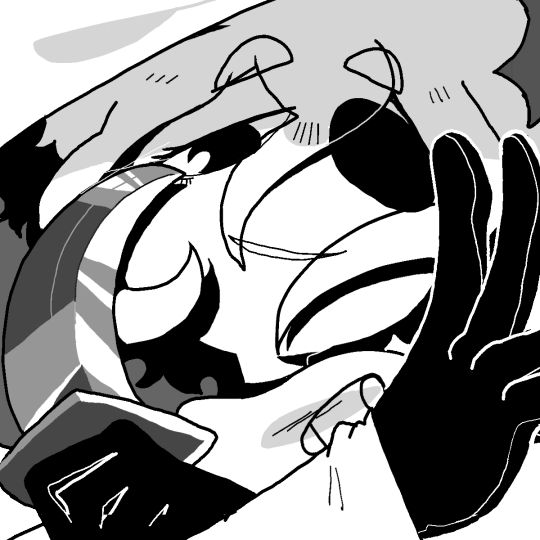
(image to show how i feel posting this and as an attention grabber over my wall of text)
To pull a definition of ludonarrative harmony out of a hat, game writer Lauryn Ash defines it as follows:
Ludonarrative harmony is when gameplay and story work together to create a meaningful and immersive experience.
From a design implementation perspective, it is the synchronized interactions between in-game actions (mechanics) and in-world context (story).
It is, generally speaking, how well game mechanics work hand in hand with the story. I, personally, think ISAT is an absolute masterclass of it, so I want to take a look at how ISAT specifically uses its battle system to emphasize Siffrin's character arc and create organic story moments. I want you to keep this in mind when I talk here.
So, skills, right? If you've played any turn-based RPG, you know your Fire spells, your "BACKSLASH! AIRSLASH! BACKSLASH!" and the many ways to style those.
Well, what does casting "Fire" say about your character? Not all that much, does it? Perhaps you'll have typical divisions. The smart one is the mage, the big brawny one is your tank, the petite one's the healer. And that's the barebones of ISAT's main party, but it's much more than that.
Every character's style of combat tells you something about them. Odile, the Researcher, is the most well-travelled and knowledgable of the bunch. She's the one with the expertise to keep a cool head and analyze the enemy, yet also able to use all three of the Rock-Paper-Scissors craft types.
To reflect her analytical view of things, all her skill names are just descriptive, the closest to your most bog-standard RPG. "Slow IV" or "Paper III" serve well to describe their purpose. The high number of the skills gives the impression there were three other Slow skills beforehand - fitting, considering the party starts at level 45, about to head into the final dungeon. She's also the oldest, so she's the slowest of the bunch.
Isabea, the Fighter, has all his skills in exclamation points. "YOUR TURN!!!" "SO WEAK!!!" "SMASH!!!" they're straightforward, but excited. He's a purposefully cheerfull guy, so his skills revolve around cheering on his allies. He's absolutely pumped to be here, and you see that from his skill names alone.
Mirabelle, the Housemaiden, is an interesting case. She's by all means the true protagonist of this tale - She's the one "Chosen by the Change God," the only one who survived the King's first attack, the only one immune to his ability to freeze time, the only dual-craft type of the game - just a lot of things. And her skill names reflect that facade she puts on herself - she can do this, she can win! She has to believe it, or else she starts doubting. This is how you get "Jolly Round Rondo" and "Mega Sparkle Heal" or "Adorable Moving Cure." She's styled every bit a sailor scout shojo heroine, and her moveset replicates the naming conventions of "In the name of the moon, I'll punish you!"
Even Bonnie, the Kid, who can't be controlled in combat, has named craft skills. And they very much reflect that Bonnie is, well, a kid. "Wolf Speed Technique" or "Thousand Blows Technique" are very much the phrasings of a child who learned one complicated word and now wants to use it in everything to seem cooler than they are, which is none, because they're twelve.
Siffrin's skills are all puns.
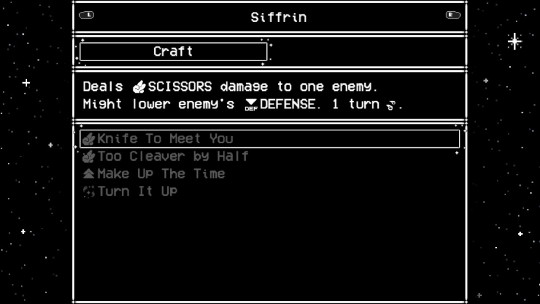
You have an IMMEDIATE feel for personality here. Between "Knife to Meet You!" and "Too Cleaver by Half," you know Siffrin's the type to always crack a joke no matter the situation, slinging witticisms around to put Sonic the Hedgehog to shame. It's just such a clever way to establish character using a game mechanic as old as the entire history of RPGs.
This is only the baseline of the way the combat system feeds into the story, though.
The timeloop, of course, feeds into it. Siffrin is the only character who retains experience upon looping, whereas all other characters are reset to their base level and skills. And it sucks (affectionate).
You're extremely likely to battle more often the earlier in the game you are - after all, you need the experience (for now.) Every party member contributes, and Siffrin isn't all that strong on their own, since they focus on raw scissor type damage with the addition of one speed buff. (Of course it's a speed buff. They're a speedy fucker. Just look at him).
At first, the difference in level between Siffrin and the rest of the group is rather negligible. Just a level or two. Just a bit more speed and attack. And then Siffrin grows further and further apart. Siffrin keeps learning new skills. He gets a healing skill that doubles as an attack boost, taking away from both Mirabelle's and Isabeau's usefullness. He gets Craft skills of every type that even give you two jackpot points instead of one - thus obliterating Odile's niche. Siffrin turns into a one-person army capable of clearing most encounters all on their own.
Siffrin's combat progression is an exact mirror of story progression - as their experience inside the loops grows, they also grow further and further away from their party. The party seems... weaker, slower, clumsier. Always back at their starting point, just as all of their character arcs are reset each loop. Never advancing, always stagnant. And you have Siffrin as the comparison post right next to them.
I also want to point out here a change from Act 2 to Act 3 - Siffrin's battle portrait. He stops smiling.
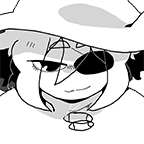
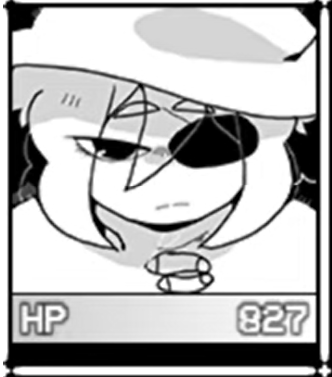
Battles keep getting easier. This is true both for the reason that Siffrin keeps growing stronger even when all enemies stay the same, but also for the reason that you, the player, learn more about the battle system and the various encounters, until you've learned perfect boss clear strategies just from repetition. Have you ever watched a speedrunner play Pokemon? They've played this game so many times, they could do it blindfolded and sleeping. Your own knowledge and Siffrin's new strength work in tandem to trivialize the game's entire combat system as the game progresses.
(Is it still fun? Playing it over, and over, and over again? Is it?)
You and Siffrin are in sync, your experience making everything trivial.
As time goes on, Siffrin grows to care less and less about performing right for their party and more and more about going fast. A huge moment in his character is marked by the end of Act 3; because of story events I won't delve too deeply into, Siffrin has grown afraid of trying something new. And his options of escape are closing in. They need an answer, and they need it fast. He doesn't have the time or patience to dumb himself down, so you unlock one new skill.
It doesn't occur with level up, or with a quest, or anything at all. At the start of Act 4, it simply appears in Siffrin's Craft skills.
(Just attack.)
No pun. No joke. Just attack. Once you notice, the effect is immediate - here you have it, a clear sign of how jaded Siffrin has become, right at every encounter. And it's a damn good attack, too! The only available attack in the game that deals "massive" damage against all enemies. Because it doesn't add any jackpot points (at least, it's not supposed to), you set up a combo with everybody else, but Siffrin simply tears away at the enemy with wild abandon. Seperated from the rest of the party by the virtue of no longer needing to contribute to team attacks (most of the time. It's still useful if they do, though).
Once again, an aspect of the battle system enhances the degree of separation between Siffrin and the static characters of his play. You're incentivized to separate him, even.
Additionally, there are two more skills to learn. They're the only skills that replace previous skills. You only get them at extremely high levels, the latter of which I didn't even reach on both of my playthroughs.
The first, somewhere in the level 70 range, Rose Printed Glasses, a paper type craft skill, is replaced by Tear You Apart. It's still a pun about paper, but remarkedly more vicious.
The second is even more on the nose. At level 80, In A While, Rockodile!, a rock type craft skill, is replaced by the more powerful Rock Bottom.
I didn't get to level 80. If you do, you pretty much have to do it on purpose. You have to keep going much longer than necessary, as Siffrin is just done. And the last skill he learns is literally called Rock Bottom.
What do I even need to say, really.
Your party doesn't stay static forever, though.
By doing their hangout quests, side quests throughout the loops that result in Siffrin and the character having a heart to heart, all of them unlock what I'd call an "ultimate" skill. You know the type - the character achieved self-fulfillment, hit rank 10 on their confidant, maxed out their skill tree, and received a reward for their trouble.
These skills are massively useful. My favorite is Odile's - it makes one enemy weak to all Craft types for several turns, which basically allows you to invalidate the first and third boss, as well as just clown on the King, especially once Siffrin starts racking up damage.
But the thing is. In Act 3, when you first get them, yeah, they're useful. But... do you need them? After all, they're such a hassle to get. You need to do the whole character quest again, you can't loop forward in the House or you'll lose them. If you want to take these skills to the King, you need to commit. Go the full nine-yards and be nice to your friends and not die and not skip forward or skip back. Which is annoying, right?
Well, I sure did think so during Act 4. After all, a base level party can still defeat the King, just with a few more tricky pieces involved. Siffrin can oneshot almost all basic enemies by the time of Act 4. It's this exact evalutation that you, the player, go through everytime you return to Dormont. Do I want this skill, still? Would it not be faster to go on without it? I'm repeating myself, but that's the thing! That's what Siffrin is thinking, too!

I also want to take a quick moment to note, here - all skills gained from hangouts have art associated with them, which no other skills do. This feature, the nifty art, hammers home these as "special" skills, besides just how they're unlocked.
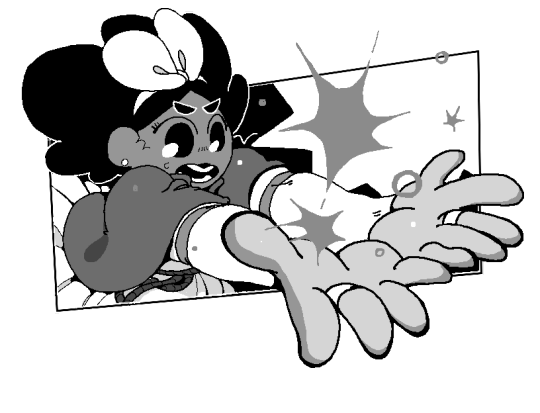
Siffrin also has one skill with associated art.
Yeah, you guessed it, it's (Just attack.)
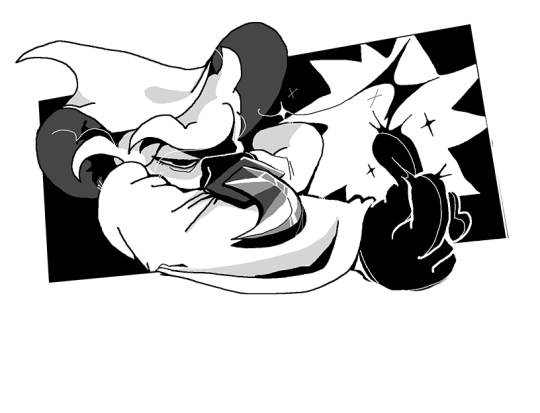
At first, helping the characters is tied to a hefty in-game reward, but that reward loses its value, and in return devalues helping Siffrin's friends every loop. It's too tedious for a skill that'll make a boss go by one turn faster. You, the player, grow jaded with the battle system. Grinding experience isn't worth it, everybody's highest levels are already recorded. Fighting bosses isn't worth it, it's much faster to loop forward.
Isn't this what all endgame in video games looks like? You already beat the final boss, and now... what challenge is left? Is there a point to keep playing? Most games will have some post-game content. A superboss to test your skills against, but ISAT doesn't have any of that. You're forever left chasing to the post-game. That's the whole point - to escape the game.
As most games get more difficult as time passes, ISAT only gets easier. The game becomes disinterested in expanding its own mechanics just as I ran out of new things to fight after 100%-ing Kingdom Hearts 3. Every encounter becomes a simple game of "press button to win."
The final boss just takes that one up a notch.
Spoilers for Act 5 ahead boys!
In Act 5, Siffrin utterly loses it. His last possible hope for escape failed him, told him there's nothing she can do, and Siffrin is trapped for eternity. So of course, they go insane and run up the entire House without their party.
This just proves what you already knew - you dont need the party to proceed. Siffrin alone is strong enough. And here, Siffrin has entirely shed the facade of the jokester they used to be. Every single skill now follows the (Just attack.) naming conventions. Your skills are: (Paper.) (Rock.) (Scissors.) (Breathe.)

To the point. Not a moment wasted, because Siffrin can't take a moment longer of any of this. Additionally, his level is set to 99 and his equipment becomes fixed. You can't even pick up items anymore! Not that you needed them at this point anyway, right? Honestly, I never used any items besides the Salty Broth since Act 2, so I stopped picking items up a long time ago. Now you just literally can't.
Something I've not talked about until now - one of the main equipment types in this game are Memories, gained for completing subquests or specific interactions and events. They all by and large have little effects - make Odile's tonics heal more, or have Mirabelle cast a shield at the start of combat. For the hangout events, you also gain an associated memory that boosts the characters' stats by 30. It lets them keep up with Siffrin again! A fresh wind! Finally, your party members feel on par with you again!
...For a time. And just like that, they're irrelevant again, just as helping them gave Siffrin a brief moment of hope that the power of friendship could fix everything.
In Act 5, your memory is set to "Memory of Emptiness." It allows you to loop back in the middle of combat. You literally can't die anymore. Not that Siffrin could've died by this point in the first place, unless you forgot about the King's instant-kill attack. This one memory takes away the false pretense that combat ever had any stakes. Siffrin's level being set to 99 means even the scant exp you get is completely wasted on them. All stakes and benefits from combat have been removed. It has become utterly pointless.
Frustrating, right? It's an artistic frustration, though. It traps you right here in Siffrin's shoes, because he hates that all these blinding Sadnesses are still walking around just as much. It all inspires just a tiny fraction of that deep rolling anger Siffrin experiences here in the player.
And listen, it was cathartic, that one time Siffrin snapped and stabbed the tutorial Sadness, wasn't it? Because who enjoys sitting through the tutorial that often? Siffrin doesn't. I don't, either.
So, since combat is an useless obstacle now meant to inspire frustration, what do you do for a boss? You can't well make it a gameplay challenge now, no. The bosses of Act 5 are an emotional challenge: a painful wait.
First, Siffrin fights the King, alone. This is already nervewracking because of one factor - in every other run, you need Mirabelle's shield skill, or else you're scripted to die. You're actually forced to fight the King multiple times in Act 3, and have to do it at least once in Act 4, though you'll likely do it more. Point is: you know how this fight works.
You know Siffrin's fight is doomed from the outset, but all you can do is keep slinging attacks. Siffrin is enough of a powerhouse to take the King's HP down, what with the healing and buff skills they have now, not to even mention you can just go all in on damage and then loop back.
(And no matter which way you play it, whether you just loop or use strategically, it reflects on Siffrin, too. Has he grown callous enough not even death will stop their mission? Or does he still avoid pain, as much as he can?)
This fight still allows you the artifice of even that much choice, not that it matters. The other shoe drops eventually - Siffrin becomes slower, and slower. Unsettling, considering this game works on an Action Gauge system. You barely get turns anymore. The screen gets darker, and darker. Until Siffrin is frozen in time, just as you knew he had to be, because you know how this encounter works, know it can't be cleared without Mirabelle.
And, then, a void.
Siffrin awakens to nothingness. The only way to tell you've hit a wall is if Siffrin has no walking animation to match your button inputs. You walk, and walk, until you're approached by.... you. The next enemy encounter of the game, and Siffrin's absolute lowest point: Mal Du Pays.

Or, "Homesickness," in english. If you know the game, you know why it's named this, but that's not the point at the moment.
Thing is, where you could damage the King and are damaged in turn, giving you at least a proper combat experience, even if its doomed to fail, Mal Du Pays has no such thing.
You can attack. You can defend. But it is immune to all attacks. And in return, it does nothing. It's common, at least, for undefeatable enemies to be a "survive" challenge, but nope. The entire fight is "press button and wait." Except, remember the previous fight against the King? The entire time, you were waiting for the big instant death attack to drop. That feeling, at least for me, carried forward. I was incredibly on edge just waiting for the other shoe to drop. And, as is a pattern, Siffrin is, too. As Siffrin's attacks fail to connect, they start talking to Mal Du Pays.
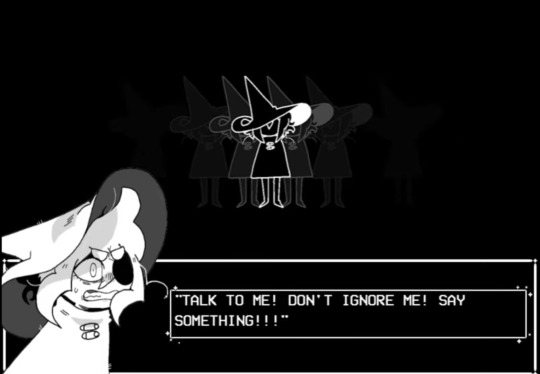
But he gets no response, as you get no attacks to strategize around. The wait for anything to happen is utterly agonizing. You and Siffrin are both waiting for something to happen. This isn't a fight. It just pretends to be. It's an utter rugpull, because Siffrin was so undefeatable for most of Act 4 and all of Act 5 so far. It's kind of terrifying!
and it does. It finally does something. Ma Du Pays speaks, in the voice of Siffrin's friends, listing out their deepest fears. I think it's honestly fantastic. You're forced to just sit here and listen to Siffrin's deepest doubts, things you know the characters could not say because it references the timeloops they're all utterly unaware of. This is all Siffrin, talking to himself. And all you, all Siffrin, can do, is keep wailing away on the enemy to no effect whatsoever.
So of course this ends with Siffrin giving up. What else can you do?
And then Siffrin's friends show up and unfreeze them and it's all very cool yay. The pure narrative scenes aren't really the main focus but I want to point out here:

A) Mirabelle is in the first party slot here, referencing how she's the de facto protagonist, and Bonnie fills in the fourth slot left empty, which shows all characters uniting to save Siffrin
B) this is the only instance of the other party members having act specific battle icons: they're all smiling brightly, further pushed by the upbeat music
C) the reflecting shield Mirabelle uses to freeze the King uses a variation of her hangout skill cut in, marking it as her true "final" skill and giving the whole fight a more climatic feeling.
It's also a short gameplay sequence with Siffrin utterly uninvolved in the battle. You can't even see them onscreen. But... it feels warm, doesn't it? Everybody coming together. Siffrin doesn't have to fight anymore.
At last, the King is defeated. Siffrin and co. make for the Head Housemaiden, to have her look at Siffrin's sudden illness. Siffrin is utterly exhausted, famished, running a fever. And this isn't unexpected - after all, their skills in Act 5 had no cooldown. For context, instead of featuring any sort of MP system, all skills work on a cooldown basis, where a character can't use it for a certain number of turns. The lowest cooldown is actually Siffrin's Knife to Meet You, which has a cooldown of 1. In universe, this is reasoned as the characters needing a break from spamming craft in order to not exhaust themselves.
Siffrin's skills in Act 5 having no cooldown/being infinitely spammable isn't a sign of their strength - it's a sign that he refuses to let himself rest in order to rush through as fast as possible.
Moving on, Siffrin panics when seeing the Head Housemaiden, because seeing her means one thing: the end. Prior to this in the game, every single time you beat the King, the loop ends when you talk to the Head Housemaiden.
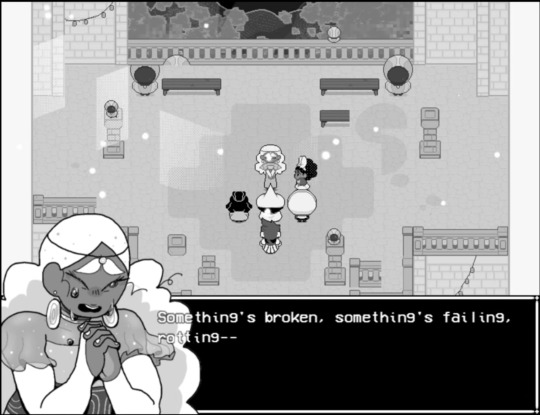
Reality breaks down, the whole shebang. It's here that Siffrin realizes - they don't want the loops to end, because the end of their journey means their family will leave, and he'll be alone again. The happiest time of his life will be over.
Siffrin goes totally ballistic, to say the least.
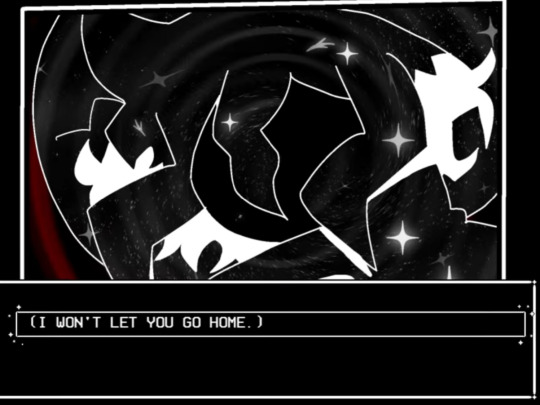
As it turns out (and was heavily foreshadowed narratively), Siffrin has been using Wish Craft to subconciously cause the timeloop because of their abandonment issues. It's rather predictable if you paid attention to literally anything, but it's extremely notable how heavily Siffrin is paralleled to the King, the antagonist they swore to kill by themself at the start of Act 5. The King wants to freeze Vaugarde in time because it is, in his mind, "perfect," for accepting him after he lost his home - a backstory he shares with Siffrin.
Siffrin has become the exact antagonist he swore to kill, and it's shown by how the next fight utterly flips everything on its head.
Siffrin is the final boss.

In a towering form made of stars, Siffrin looks down at their friends. His face is terrified, because of his internal conflict; he can't hurt his friends, but he can't let them go, either. The combat prompt is simply changed to "END IT!"
This fight is similar to the previous, in that you just need to wait a certain number of turns until its over. However, this time, it's not dreadful suspense. It's... confusion, and hesitance.
You have two options for combat: Attack your friends, or attack yourself.
And... you don't really want to do either, I think. I certainly don't. But what else can you do? It's Siffrin's desires clashing in full force. Attack your friends, and force them to stay? Or attack yourself, and let them go safely without you?
Worth noting, here - when you attack Siffrin's friends, you can't harm them. Isabeau will shield all attacks. And when you attack yourself, Mirabelle will heal you back to full. And the friends don't... do anything, either. How could they? Occasionally, Mirabelle heals you and Isabeau shouts words of motivation, but the main thing is...
(Your friends don't know what to do.)
None of them want to harm Siffrin. Both sides simply stare at each other, resolute in their conviction but unwilling to end it with violence. It's of note that this loop, the last one, is the only loop where the King isn't killed. Just frozen. And now here is Siffrin, clamoring for the same eternity the King was. Of course everything ends in a tearfilled conversation as Siffrin sees their friends won't leave him, even after the journey ends, but I still have to appreciate this moment.
Siffrin is directly put in the position with their friends as his enemies, forced to physically reckon that keeping them in this loop is an act of violence, against both their friends, and against himself.
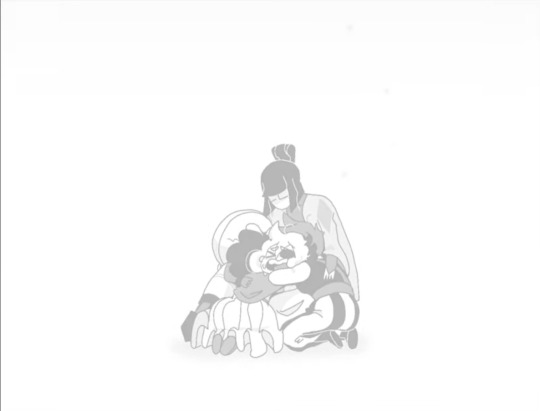
It's a happy ending. But... what does it mean?
Of course, ISAT is obviously about the fear of change. Siffrin is afraid of the journey ending, and of being alone. However, ISAT is also a game about games. Siffrin is playing the same game, over and over, because it's comforting. It's familiar. It's nice, to know exactly what happens next. These characters might just be predictable lines of dialogue, but... they feel like friends. Have you ever played a game, loved it, put countless hours into it, but you never finished it? Because you just couldn't bear to see it end? For the characters to leave your life, for there to be a void in your heart where the game used to be?
After all, maybe it became part of your routine! You play the game every day, slowly chipping away at it for weeks at a time. For me, I beat ISAT in four days. It utterly consumed me during this time. I had 36 hours of playtime by the end. Yeah, in that week, I did not do much more than play ISAT.
And once i beat it, i beat it, again. I restarted the game to see the few scenes I missed, most specifically the secret boss I won't talk about here. I... couldn't let go of the game yet. I wanted to see every scrap I could. I still do. I'm writing this, in part because I still do. It's scary to let go.
Ever heard the joke term of "Postgame Depression?" It's when you just beat a game, and you're suddenly sad. Maybe because the ending affected you emotionally and you need to process the feelings it invoked, or you search for something that can now fill your time with it gone.
The game ends, for real this time, the last time you talk to the Head Housemaiden. But Siffrin gets... scared. What if everything loops back again? And so, his family offers to hold his hand. They face the end, together.
For all loops, including the ending, you never see what happens after. After they leave the loop for good. Because the loop is the game itself. It's asking you to trust that life goes on for these characters, and it holds your hand as it asks you to let go. There's a reason for Siffrin's theater metaphors. He is the actor, and the director, asking everyone to do it over one more time. He's a character within the game, and its player.
There's a reason I talked about endgame content. This, the way it all repeats, there's nothing new, difficulty and stakes bleed away as you snap the game over your knee - it's my copy of White 2 with two hundred hours in it. It's me playing Fire Emblem Awakening in under 3 hours while skipping every cutscene. Are you playing for the sake of play, for the sake of indulging in your memories, because you're afraid of the hole it'll leave when you stop?
Of note: the narrative never condemns Siffrin for unwittingly causing their own suffering. He's a victim of circumstance. It's seen as endearing, even, that Siffrin loves their friends to the point of rather seeing the world destroyed than them gone. But Siffrin is also told: we'll stay with you for now, but we'll part ways eventually. And one day, you'll have to be okay with it.
Stop draining the things you love of every ounce of enjoyment just because you're afraid of what happens next. I'm not saying to never play your favorite games again. Playing ISAT a second time, I still had a lot of fun! I saw so many new things I didn't before, and I enjoyed myself immensely, reading the same dialogue over and over. But... it makes me look at other games I love and still play, and makes me ask... is this still fun? Do I still need to play this game to enjoy it? Even writing this is an afterimage of my enjoyment, but it's a new way to interact with the game, to analyze it through this lens. Fuck, man, I write fanfiction. Look at me.
All of this, fanart, fanfic, analysis, is a way to prolong that enjoyment without making yourself suffer for it. Without just going through the motions of enjoyment without actually experiencing any. But one day, the thing you love won't be fun to talk and write and draw about. And it's okay. You'll have new things to love. I promise.
In the end.... I'm certain I'll replay ISAT one day. Between great writing, art, puzzles and unresolved mysteries, it's my shoe-in for game of the year.
But I won't replay it for quite some time. I've had enough, for now, so I let my love take other forms.
Siffrin is never condemned, because love is no evil. Be it love for another person, or for a game. And please, if you're overempathetic - it's still a game, at the end of the day. The great thing about games is that you can always boot them up again, no matter how long its been.
A circle within a circle indeed.
To summarize:
The repetitiveness of ISAT's combat, lack of new enemies, and Siffrin's ever increasing strength eventually allows you to snap the combat over your knee, rendering it irrelevant and boring. Though this may seem counterproductive at first, it perfectly mirrors how Siffrin has also grown bored with these repeated encounters and views them only as an obstacle to get past. The reflection of Siffrin's own tiredness with the player's annoyance increases the compassion the player has for Siffrin as a character.
Additionally, the endgame state of the combat system serves as commentary on the state of a favorite game played too often, much like how Siffrin has unwittingly trapped themself in the loop. Despite the game having no more challenge or content left to over, a player might return to their favorite game anyway, solely to try and recreate the early experience of actually having fun with it. This ties into ISAT's metanarrative about the fear of change and refusal to let go of comfort even when the object (here, your favorite video game) offering that comfort has become utterly bereft of any substance to actually engage with. Playing for the sake of playing, with no actual investment to keep going besides your own memories.
Later on, stripping away even the pretense of strategy for a "press button and wait" format of final bosses highlights the lack of options at Siffrin's disposal and truly forces the player into their shoes. Truly, the only way to win is to stop playing.
#feli speaks#in stars and time#isat#isat spoilers#lays down on floor. it's done. it's done#i actually narrowed down in scope to just focus on the combat by the way. and this is like. several thousand words
1K notes
·
View notes
Text
watching all these hays code movies amidst this media sanitization effort is so strange because like. you can Tell when these movies want to be about sex and violence in a more explicit way and are therefore using film techniques and literary devices to suggest sexual desire and gayness and whatever else when they couldn’t make it obvious. and like. they did a good job! i felt more sexual tension in gilda or all about eve than i have in like any recent movies. and it’s because they know what their story is about and it’s the structural rules and system that prevents them from being able to tell it. but that also mean they’re actively trying to tell it, despite the restriction, and making something that will still give you the same feelings
but this is almost worse because it’s not explicitly limiting storytellers but rather training us on what stories to accept. the hollywood execs aren’t saying “no you can’t make this story.” instead they say but wouldn’t you rather have this one? and the culture is just accepting it because their brains are broken and if you have thousands of people screaming no sex in movies and hollywood says great we’ll stop then. there’s no working around because you just hire a director that won’t do sex. instead of a director telling their story despite their limitations you have the stories being selected and tested and researched and THEN a director. and you can’t find the little corners to fight back in a system that picked you to precisely fit its purposes. especially when the audience seems perfectly willing to go along with it as if any of this is a natural process of art
1K notes
·
View notes
Text
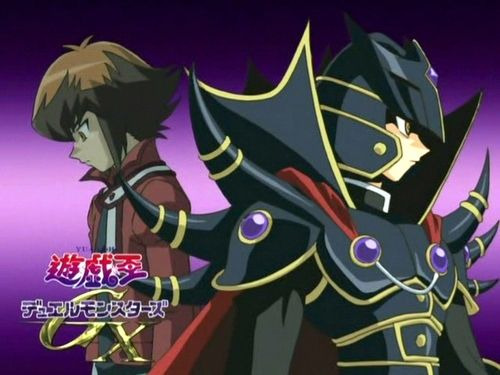

The Supreme King Judai vs. Dark Deku: How To Do a Dark Deconstruction of your Shonen Hero!
Think of this as less me complaining about My Hero Academia, and more me taking a closer look at the writing of the Dark Deku arc and why it failed to achieve what it set out to achieve.
I like to look at writing on a deeper level than Thing Bad, and Thing Good. Imagine a story is a car engine that won't start, in order to find the problem you've got to disassemble all the pieces and look at them one by one to see what pieces aren't working. That's the kind of criticism I'm talking about, break storytelling down into different tools like parts of an engine, plot, world, characterization, ideas, actions and consequences and then look if the author is using those tools effectively to sell a story.
In other words we're talking about the difference in ideas and execution. All works of fiction have ideas, even bad anime can have good ideas inside of it. The idea in question is Judai's case is can exploring the dark side of a hero. Can a hero's positive qualities also lead them down a dark path? Yu-Gi-Oh Gx answers this in a satisfying way, and My Hero Academia I'm going to argue does not.
IDEAS VS EXECUTION
One piece of writing advice I heard from Brandon Sanderson of all people that always stuck with me is "Ideas are cheap. You can always come up with more ideas."
All works of fiction have ideas and themes no matter what the Game of Thrones guy say, but some works are better at communicating their ideas than others. I want to quote a Homestuck Ending analysis of all things to explain what I'm talking about.
When you are a writer you can write anything you want. But if you want to write a story that people want to read you have to follow the rules of good storytelling.
There are reasons why storytelling rules exist. A story is a bond between author and reader, readers to other readers. It is a communication between humans and humans work in a certain way.
Storytelling rules are rules of communication. Rules for handling expectations and saying what you intend to say without it being misheard. Rules for tugging at emotions and pulling heartstrings in a good way rather than a bad way. Storytelling rules are lessons learned by authors of the past that failed to communicate what they needed to. They are not that subjective.
Chief among these rules is buildup and payoff. In fact one of the most basic techniques of storytelling is foreshadowing, in screenplays you usually foreshadow one important twist, then add a reminder so the audience doesn't forget, before finally paying it off.
To simplify build up and pay off I like to refer to it as question and answer. Usually a story will ask its audience a question, and usually by the end that question is answered, unless the point is to leave that question unanswered / ambiguous.
Character arcs are examples of buildup and payoff too, a lot of characters, especially in serialized media are sold on their potential future development. Here's an example, how may people got invested in Dabi years in advance because of the Dabi is a Todoroki Theory? That's an example of good buildup and payoff, because the author sewed just enough hints to build up an audience expectation and then paid it off. People became invested in the story, because they thought their investment and theories would pay off eventually and it did - so hooray!
Both MHA and YGOGX dedicate an entire arc to trying to deconstruct their main protagonist. They also seek to deconstruct the "Hero Complex" or "Saving People Complex" that each protagonist has, and ask the question if those traits are really a good thing.
This post puts it better than me so I'm going to quote tumblr user rhodanum.
‘Hero complex’ or 'saving people complex’ — an obsession with rescuing people in the face of danger, often to the exclusion of all higher thought processes. All too prevalent among shounen main leads, especially hot-blooded shounen main leads. Yuki Judai is certainly no exception. What is interesting in his case is that the writers follow the consequences of his rash, reckless, often thoughtless actions all the way to their heartbreaking logical conclusion.
For those not fully in the know, it involves spiky black armor, an army of sycophants and a fall from grace that caused as much damage as a thermonuclear bomb. Don’t make perky, happy shounen protagonists snap, people. First rule.
I'm going to quote another video too, to add onto the above quote. It's from this video, starting at around 39:52
"GX is kind of famous among fans for taking its happy protagonist and stripping him down to all of his worst qualities. And that's fun. So Judai is a character who's really interesting. He's definitely open to a lot of interpretation, and you know we're gonna be leaning on my interpretation of him. Sorry. It's my video. I think he's commonly referred to a "very typical shonen protag" probably one of the most shonen protag of the yu gi oh protagonists. He is headstrong and loud, and (makes punching noises while air boxing), he is a type of character who's like I'm gonna be the best and brings everyone along on the ride. He's the kind of protagonist that everybody loves him they're all fighting over him, and Yu Gi Oh Gx really puts him up on the pedestal, of like THIS GUY. THIS GUY DOES IT ALL. Then season 3 rolls around and dares to ask: but what if that's selfish behavior?"
That's the question both MHA and YGOGX are asking in Dark Deku arc and Season 3 respectively, what if all of those behaviors that make them the typical hot blooded shonen protagonist are actually selfish? Is their hero complex really a good thing?
Each arc is tasked with exploiting the main character's flaws, until they reach their emotional breaking point and lowest point in the story. Let's see how each story treats their main character and from comparing that I want to make a point about what makes effective storytelling.
The Supreme King Haou Arc
Instead of recapping the entire arc to you, I'm going to touch upon what ideas the story setup in regards to Judai's character and how it paid off those ideas. What are the questions the story asks and what answers does it give us?
I'm going to focus on the two questions I outlined above. Is their hero complex a good thing? and What if this is selfish behavior?
Yu-Gi-Oh GX is an anime where instead of using super powers, the main characters fight each other with a magical trading card game. Besides that fact there's a lot of similarities between GX and MHA. They both take place in an academy setting where the main characters learn about using their quirks, and playing the card game better respectively. It is a shonen battle anime where almost everything is solved with a shonen fight, they just use cards instead of flashy superpowers. The main characters are all students who have to grow up and enter the adult world.
Judai and Deku are both characters that deconstruct the "hero complex" of shonen main characters. Judai is themed entirely around heroes, he has an elemental hero deck where every hero is based off a hero that appears in popular culture, he is the best duelist in the school and the one everyone calls on to save the day over and over again. As stated above he is the most Shonen Protag to ever Shonen Protag, he's a warrior therapist who makes friends and saves the day because he's really good at the card game, and will always show up to fight for his friends.
For the first two seasons Judai is built up on this pedestal of the ideal Shonen Protagonist, and praised by basically every single character for being "childish" and "pure of heart" however when Season 3 comes around the narrative stops heaping endless praise on him and starts to challenge him. However, this doesn't come from nowhere there are signs of these personality flaws of Judai, they just get swept under the rug the first two seasons.
There are several moments such as the climaxes to season 1 and season 2 where Judai fails to grasp the stakes of the situation, saying things like "Oh, this card game is really fun" when he's dueling with lives on the line. Judai in fact has a pattern of "only wanting to duel for fun", he fights because it's fun to him not because it's the right thing to do. However, he's continually forced into high stakes situation where he has to fight for others just because he's the strongest character - and constantly having to carry that on his shoulders starts to weigh on him after awhile. Judai will show up to fight and save his friends every single time they need him, and that's the source of his hero complex because after a certain point his friends start relying on him too much.
In general he also doesn't have deep thoughts of what heroes are, he admires heroes but it basically boils down do "Heroes are cool." He's kind of like Goku where he doesn't really fight for any idea of justice or to save others, just for the thrill of fighting itself. He also has a tendency to be insensitive to other people's feelings and take things for granted. For example, in Season 2 like three of his friends get possessed and Judai doesn't even do anything about it for half a season because he's too busy participating in the dueling tournament.
In general though it's a pattern of Judai only wanting to "duel for fun" and him being forced to duel to save others instead, and be responsible for other people. Judai will show up to fight for his friends, but even then he falls back on just "dueling for fun" because always having to fight for others is too much responsibility to put on his shoulders.
There's a lot of hints of Judai's flaws, but they also tend to get brushed off because shonen protagonists are just like that. Like, Judai can say some insensitive things to his friends sometimes and be oblivious to their feelings, well he's just a book dumb shonen protagonist. Judai should be taking this fight seriously, well he's just being a happy go lucky shonen protagonist, etc. etc. A lot of these things are also just swept under the rug as him just being a child, a boy-at-heart like most shonen protagonists are supposed to be.
However, season 3 starts looking at Judai not as a shonen protagonist but as a person, and it all starts with the suggestion that maybe Judai remaining a child at heart is a bad thing, especially when his friends around him are all growing up. It all starts with the introduction of this guy right here - Johan Anderson.
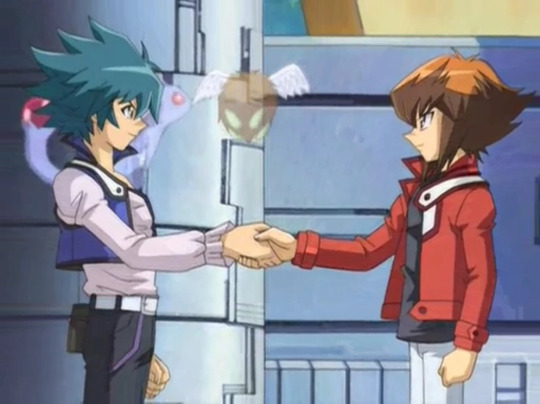
Johan shares many things in common with Judai, he can see spirits, he's a duelist who loves to duel, he has a strong connection with his cards. However, the more you compare them the more you notice that Johan has a lot of things that Judai lacks. They are so similiar that they become almost instant best friends, but even then Johan himself notices there are a few things off about Judai's behavior.
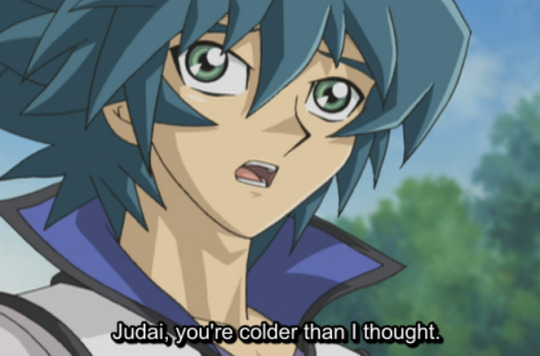
Sho: Bro... I thought you would have something to say to me.
Johan: He seems lost. I think he just wanted you to give him some advice.
Judai: SHo will be fine.
Johan: Judai, you're colder than I thought.
It takes someone completely new to the dynamic between Judai and his friends, who likes Judai but hasn't spent the past two seasons idolizing him to realize that some of his behaviors are kind of off. That Judai isn't really the most empathic, or even that good at understanding other's feelings.
Johan is the one to point this out because he has the emotional intelligence that Judai lacks. We've been told Judai is our shonen protagonist for two seasons, only for the real shonen protag Johan to step up out of nowhere and show them how it's done. Johan is good at seeing other people's emotions, and he becomes a near instant pillar of emotional support for Judai. More than that, he also is the first person to treat Judai like an equal, he never asks Judai to save him like all of Judai's friends do, if anything they both save each other.
Johan also exists to show what Judai is lacking, mainly a reason behind why he fights.

Judai: I do it because it's fun. Or because of the surprise and delight, I guess. Well, I guess that comes down to "because it's fun", huh? Sorry, I guess that's an awkward question to ask out of nowhere.
Johan: What's wrong, Juadi?
Judai: Nothing, really.
Johan: I have a proper goal.
Judai: Don't tell anyone. Even if people don't have the power to see spirits, they can still commune with them. That's why, for those people as well... (I want to be a bridge between humans and spirits).
Judai is someone who will always show up to save his friends when he is asked, but he doesn't really have a concept of what being a hero is or the repsonsibilities it entails, he just admires heroes in a pure hearted way. Johan on the other hand has a reason to fight and that's to help humans and card spirits get along, and Judai expresses admiration for Johan because he has a goal.
At the same time this is happening, Judai gets picked apart by two villains for his lack of reason for fighting. Judai has been praised to death for two seasons for being pure of heart, but now the villains are challenging him by saying he has no "darkness of the heart". That without it the reasons that Judai fights are superficial and frivolous.
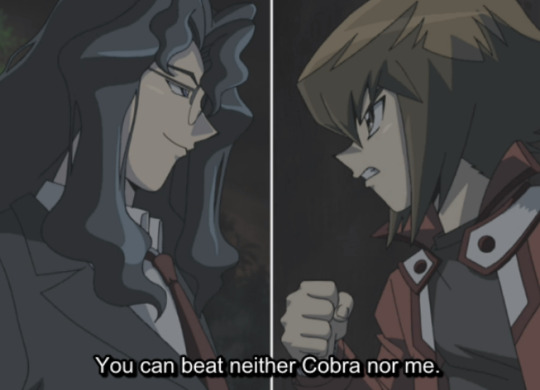
We have something that you lack.
Judai: That I lack?
Yes the darkness of the heart that slumbers deep within a duelist. The burden that a duelist bears in his heart. Judai, you have none of that.
Judai: A burden in my heart.
I have nver, not even once, dueled for myself. I doubt someone like you, who only thinks of himself could udnerstand that.
Judai: What would be fun about a duel like that?
It isn't fun at all! You must bear other's expectations while remaining strong. That is what it means.
Judai is a bit of a blood knight, he will be dueling with his friends lives on the lines and stop to go "Wow, this duel is really fun" and it's usually just dismissed a shim being a shonen protagonist until suddenly it isn't.
I'm gonna draw a deliberate parallel between Deku and Judai here that I'll reference later on, they both don't understand "darkness of the heart" and they need to understand it in order to grow as people.
There's also the underlying notion that being a hero is not all it's chalked up to be, to be a hero, to fight for other people's sake means also taking on their suffering. As noble as that may seem suffering is suffering.

Cobra: Fortune would never smile on a fool like you who fights while prattling on about enjoying duels.
Cobra: You are certainly a talented duelist. But you have one fatal flaw.
Judai: A fatal flaw?
Cobra: Yes, your duels are superficial. Someone who fights with nothing on his shoulders, cannot recover once he loses his enjoyment. What a duelist carries on his shoulders will become the power that supports him when he's up against the wall!
Cobra: But you have nothing like that! Those who go through life without anything like that cannot possibly seize victory.
Cobra: But I know that nothing I say will resonate with you... because you have nothing to lose but the match.
Judai: I...
Cobra: Afraid aren't you? Right now, you have nothing to support you.
In the context of this scene, Cobra has told everyone that he's currently enacting his evil plan out of the vain hope that he can somehow revive his son from the dead.
As insane as "I think I can revive the dead" is as a motivation, fighting for the sake of your dead son is a much stronger motivation than "I think duels are fun."
Judai doesn't have an appropriate answer as to why he fights when he's questioned by the villains, and instead of coming up with his own answer he relies on the answer Johan provided for him.
Johan: You idiot. Why are you so shaken Judai? You think you have nothing on your shoulders? Give me a break! You always bear other's expectations on your shoulders. When you have other people's expectations riding on you, it means they've trusted you with their hopes! Don't you always carry those? If you lose what will happen to us here?
Johan's words snap him out of it, but this isn't Judai coming up with an answer himself it's just taking the one that's provided for him.
This is also the point where we get start to develop an answer to our question. Is Judai selfish?
In action he's not. His actions are selfless. Judai is always fighting for others, even when he only wants to duel for fun. He will show up and fight if you ask him too.
However, in motivation he is selfish. His motivations are selfish. Judai isn't fighting out of some selflessness, but because fighting for the sake of other people gives him a purpose. He keeps fighting for his friends, because he's built all of his friendships around being the one to solve their problems. It's why he Johan's answer suits Judai so well, because he thinks that's how friendship works that he has to keep carrying everyone's burden for them.
Not only does it lead to unhealthy friendships (he sees his friends as burdens) but also it's unhealthy for Judai himself (he can't keep carrying other people's burdens without getting weighed down).
Judai's hero complex, this pressure he feels to save everyone around him arises from two things, it gives him friends when he'd been a lonely child before that, and it gives him purpose. Playing the hero is how he made all of his friends, and now it's how he keeps them.
However, in spite of doing all this to keep his friends, Judai's relationship with his friends is so all give and no take that he's practically fighting alone until Johan shows up. Judai doesn't form a healthy and stable relationship with Johan however, Johan just becomes a crutch.
In Summary:
Judai's actions are selfless.
His motivations are selfish.
Judai's purpose is to carry everyone's burdens on his shoulders.
Judai's friends exist to be saved by him.
The following arc is roughly divided into four sections. Everything I've covered above happens in the first section the Cobra Arc.
Cobra Arc
Zombie Survival Arc
Dark World / Supreme King Arc
Oh Shit, Yubel's Back
The cobra arc is the introduction and it sets up the basic ideas of Judai's character that I listed above, in addition it focuses on the question of if Judai is selfish, and the idea that being a hero is a burden. There's also the third question where Judai is called to understand darkness of the heart, something Deku will also be called to do.
The Zombie Survival arc is an arc where the school is teleported to another dimension and they have to survive for several days with a limited food supply, everyone fighting, and an outbreak of zombies.
The main setup of this arc is to show how everyone is working well together as a team, even in a high stress situation. Alexis, Judai, Misawa, Kenzan, all pull together with the help of new students Johan, Austin O'Brien and Jim Crocodile Cook.
However, I'm brushing over this arc because Judai doesn't actually do much this arc. If you analyze who does what, it's mainly Johan and Austin O'Brien who are in charge of the entire school. Johan demonstrates leadership skills, calls on everyone to pull together in a time of crisis, and most importantly emotionally supports Judai all throughout.
Even when Judai is confronting the main villain of this scenario Yubel, it's Johan who shows up to support Judai, and it's Johan who wins the duel at the sacrifice of his own life. Everyone gets through the zombie arc unscathed, but it's because Johan is the hero of this part of the arc, not because of anything Judai really did.
Judai who having gone on so long carrying other people's burdens to the point where he's made saving others his purpose, has for the first time experienced someone helping him carry those burdens only to disappear and Judai does not react well to it.
This is when the story has finished setting up all the dominoes that are about to fall. We have one mini-arc drawing attention to the dark side of Judai's personality and how he doesn't understand his own darkness, and one mini-arc showing Johan being a much more effective hero and leader than Judai, demonstrating everything Judai lacks.
You Either Die a Hero, or You Live Long Enough...
Yadda yadda you know the rest. A character being undone by the same traits that made them a hero, is classic tragedy 101. It's called the Hamartia or the fatal flaw. A character's greatest strength in some situations can be their greatest weakness in others. The Supreme King Arc is a masterclass in showing how the traits Judai had that led to his success in the first season, can lead to his total ruin, and even to him becoming the villain of his own story.
Hero and Villain are much closer than you'd realize, and this becomes especially true in the relationship between Judai and Yubel. Judai shares an extremely close relationship to his antagonist foil, just like Deku does with Shigaraki.
However, in Judai's case he's the reason that Yubel turned evil. While it's not entirely his fault, Judai's decision to abandon Yubel when he was a child, made Yubel go through ten years of painful torture all alone, which is the reason behind their current madness.
To summarize Yubel and Judai's story briefly. Yubel is a card spirit, the thing that Johan wants to serve as a bridge between card spirits and humans. Judai had an incredibly close relationship with Yubel as a child, but Yubel was overprotective and used their powers to harm anyone who came near Judai. Judai launched Yubel into space hoping the righteous space rays of justice would calm Yubel down (I know that sounds stupid just go with it) but instead Yubel was hit with the light of destruction a corrupting force that made them endure years of torture. They called out for Judai's help in their dreams only for Judai to eventually forget about them with a psychologist's intervention. Eventually the satellite they were trapped in made it's way back to earth, and they almost died burning up on re-entry. When they finally crawled their way back to Judai, they found Judai had been living the past ten years happy and surrounded by friends, while they had been tortured in space and nearly died all alone.
At which point Yubel snaps, hard.
While it's not Judai's fault entirely because he was a child and he didn't know what was going to happen, he still made the decision to abandon Yubel and stuck them in that situation. Judai's actions creaeted Yubel, and now Yubel is here broken and hurt and determined to hurt all of Judai's friends.
Judai doesn't know how to cope with the guilt or responsibility for either of these things. Both for creating Yubel, and for the fact that because of Yubel Johan might now be dead.

I'm the one who made her what she is!
This is where the show starts demonstrating that understand in darkness of the heart is necessary, because Judai can't understand two things, number one the fact he might have hurt Yubel, and two how to deal with the sense of responsibility he feels towards Yubel becoming what they are, and for Johan's apparent death.
He just feels a lot of guilt, and as someone who's only been the carefree hero up until this point he doesn't know how to deal with that guilt.
Judai makes a very similiar decision to Deku. He decides to go out and hunt for Johan by himself, leaving his friends behind so he won't risk their safety. Unlike Deku however, his friends immediately follow and insist on coming along.
This is when the problems start appearing, because the second everyone enters the Dark World to look for Johan, the show starts demonstrating clearly how different Judai's leadership is from Johan.
All of Judai's flaws start popping up, he's tactless, self-centered, and doesn't consider others feelings, and most importantly of all he doesn't look before he leaps. These behaviors that could earlier be swept under the rug, just become aggravated in a high stakes situation where everyone's lives are on the line. Judai came together with everyone to look for Johan, but he keeps acting like he's alone.
Another user's meta post here summarizes Judai's actions in the Different Dimmension, more succinctly so I'm going to quote them.
Shit Judai’s friends signed up for when they went into the Different Dimension with him:
searching for Johan
working as a team
deciding as a group what risks they’re willing to take
risking their lives together, on an even playing field
Shit Judai’s friends didn’t sign up for when they went into the Different Dimension with him:
having their input thoroughly ignored
being left behind while their friend recklessly charged ahead
having essential information kept from them (Judai didn’t tell them about the fatal consequences of dueling in Dark World)
being kept from dueling without their opinion on the matter ever being taken into account
having their physical, mental and emotional well-being be completely ignored by the de-facto group-leader
being relegated to secondary importance in comparison to Johan, in Judai’s eyes
having their group leader outright break the promises he made to them
To name a few things Judai does while in the different dimmension. Almost immediately after entering the dimension he runs away from the rest of the group, forcing Austin O'Brien to follow before anyone has even gotten their bearings or investigated where they are. Make an agreement with everyone to rest and wait for Dawn to search for Johan, only to run off into the middle of the night without telling anyone. Run off ahead of the group leaving several of their members behind, and when O'Brien tells Judai that members of their group are missing and that he should go back and search for them, Judai asks O'Brien to just do it instead.
Judai doesn't see the flaws in this behavior because it's how he's been acting all along, he always runs off into danger head first and he always fights on his own. Judai's never been good at considering the feelings of others though because he's a tad socially impaired, so he just doesn't seem to notice everyone's growing concerns with how he's acting.
Once again we are asked the question, is Judai's behavior selfish?
Judai deliberately abandons his friends three times, and the third time everyone stops to discuss his behavior.
Kenzan: True, we did come to this world to save Johan, saurus...
Fubuki: He did find some minor clues as to Johan's whereabouts, so I suppose it's only natural, but...
Asuka: But right now, I feel something is different about Judai.
Menajoume: That's right. He got us all riled up about this, and now he's totally forgotten the comrades who came along with him.
Kenzan: That's really irresponsible, Saurus.
Fubuki: I don't mean to be a wet blanket, but I wish he'd realize the anguish he's putting us through.
Asuka: Judai isn't doing this for Johan or us now. It's for himself. He just seems to be rushing forward, headlong, to forget the responsibility he bears on his shoulders.
The answer now is yes, his motivation is selfish because it's no longer about saving Johan, but just to stop himself from feeling guilty.
The stress of the situation is aggravating Judai's worst qualities yes, but Judai's always thought about himself first before others, he's always viewed his friends more as burdens / people to be saved rather than equals.
This all leads to a situation where Judai messes up big time. The same way he abandoned Yubel, he abandons the rest of his friends to run ahead and search for Johan.
They are all kidnapped - and it's Austin who notices they are missing Judai isn't even paying attention. Austin says they should head back and look for the others, but Judai asks Austin and Jim to handle that alone so he can keep searching for Johan.
Jim: The others haven't arrived yet. Something might have happned to them on the way.
Judai: I see. Sorry, but could you go back and fetch them?
Jim: What? You mean you don't care what happens to them?
Austin: Don't forget these are the friends that are in this with you. To fulfill our objective in this dimmension we need everyone working together. You wait here until we return.
Judai: Okay, I will.
Austin and Jim agree to go back and search for the others, if Judai promises to wait for them here instead of going on ahead. A promise which Judai immediately breaks.
Which is how Judai walks right into a trap.
Judai abandons his friend so they get kidnapped. He doesn't go back to look for them, so he misses out on a chance to save them. He doesn't wait for Austin and Jim to come back, and because of that he wanders all alone into a trap.
That trap is a sacrifice ritual where the leader Brron challenges him to a duel, and every time Judai attacks one of his friends are sacrificed. Judai is forced to attack and each friend dies one by one.
Judai didn't want to attack, he didn't choose to sacrifice his friends, but he did make every decision leading up to that. The trap was easily avoidable if he 1) didn't leave his friends behind 2) went looking for his friends after they were left behind or 3) waited for Jim and Austin to come back.
Judai didn't mean to sacrifice his friends, but it's a result of his own bad decisions. It's the culmination of an arc where he's been selfishly taking his friends for granted. It's a consequence for Judai just choosing to recklessly barrel forward because he can't cope with his guilt.
Judai's lack of darkness of the heart really dooms him here, because he was blind to his own flaws until it was too late. This isn't even the part where Judai does the bad thing, Judai's careless actions lead to four of his friends dying but he doesn't learn from his mistakes. He snaps, hard.
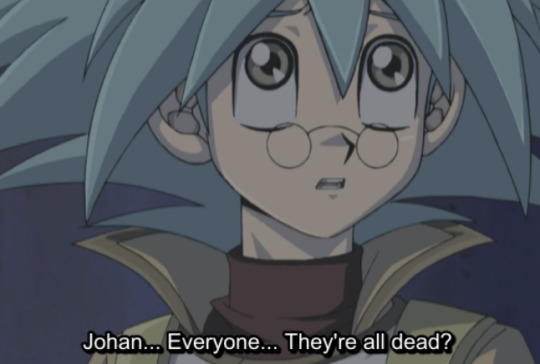
Judai: But at least I avenged them. Sho I'm really glad you're alive.
Sho: Those words... they're just lip service. Bro... bro, you're selfish. Before now, I thought of you as the sun. Someone who gave others energy and made the impossible possible. But, I was wrong. All you care about is getting your way. You don't care who you sacrifice. You'll do anything in the name of your goal. Avenging them won't bring back the people you sacrificed. You're just dueling to satisfy yourself.
Judai: O'brien!
Austin: I thought I told you to wait.
Judai: Are you saying what I did was wrong?
Austin: Think it over for yourself.
Judai: Why? What did I do that was so wrong? I... I did the right thing! And yet... everyone keeps leaving me! What... What is wrong with me?
Supreme King: Yuki Judai. To be willing to be evil to defeat evil. This world exemplfiies survival of the fittest. It must be ruled with power.
Judai: Power? I don't have that much power...
Supreme King: You hold the Super Polymerization card in your hand. Defeat the spirits that stand against you. Breathe their lives into it and complete that card.
After this point Judai decides to sacrifice everything else for power, and to complete the Super Polymerization card he's already sacrificed four friends four.
It's the culmination of an arc where Judai's only been praised for his strength and his ability to win duels. Where he constantly has been called to win duels to solve problems, until that stops working. When everyone is gone, all that's left is his strength. He had to keep winning to keep people safe, but even that wasn't enough, he was still missing something.
He knew he was missing something, that there was something wrong with him and he didn't know where to look.
Conclusion?
He needed power. If he had power, then he wouldn't have lost. If he had power then everything would have turned out alright. He didn't have the strength to carry everyone's burdens for them, that's why he lost, so what he needs is more power. He's been demanded to win, win, and win again so now winning is all that matters.
Now we have our second question: Is Judai's hero complex a good thing?
That's a definite no, because the pressure to always win, to always save everyone and carry their responsibilities has now completely broken Judai. To the point where he now believes that the only thing good about himself is that he's powerful, but he now is willing to sacrifice others to gain more power.
My name is the Supreme King.
Now here's the best part about Judai actively having a villain arc.
He does bad thngs. He does a lot of bad things.
It turns out when you're abandoned and left alone to suffer you do bad things, crazy that, I'm sure Yubel would have a lot to say about that.
Judai is also not being possessed in this scenario. They state it several times. You could say he's Shadow possessed in a Jungian sense. The supreme King is the symbolic embodiment of all of Judai's flaws that he's been ignoring until now. You could say Haou is representative of Judai's subconscious that has been repressed for so long until all those flaws finally surfaced, and that the Judai we see on a day to day basis is his ego, that the relationship between the two is a metaphor for conscious and subconscious.
Jim does a deep dive into Judai's mind, where we're shown a symbolic sequence of what the inside of his head looks like. Judai witnesses his friends appear in mirrors before they shatter one by one, all while he mumbles about how he needs to get stronger.
These are all storytelling devices to show Judai's fractured psyche, but Judai is still in control of his actions. Judai talks and responds to questions when he's addressed. Judai's friends confirm that it's still Judai, he's not a puppet or possessed.
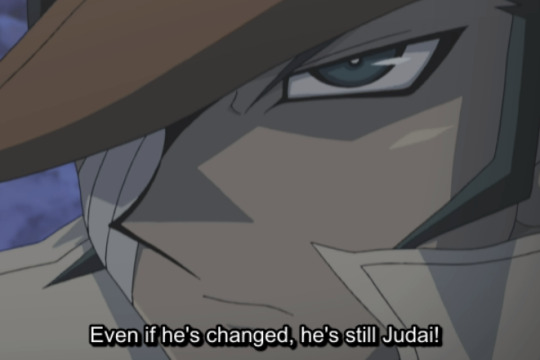
Misawa says later to Judai's face that he and the supreme king are the same person. Judai later is able to use the Supreme King's powers and maintain complete control, because the Supreme King isn't a split personality. Judai even says when Amon is sacrificing someone he loved for power, that he was doing the same thing as the Supreme King, sacrificing everything for power.
We later learn that the ritual that sacrificed four of Judai's friends was a part of Yubel's schemes, but that's the only thing Yubel set up. Judai made every bad irresponsible decision that led to his friends being captured. Judai was the one who snapped and decided to complete Super Polyermization after it was completed. Learning Yubel was behind the sacrifice ritual doesn't take away any agency from Judai at all, because Judai is responsible for his own decisions.
What it does do is create another parallel between them, because we learn the reason Yubel set up the sacrifice was to make Judai walk the same path that they did.
Judai is hurt, abandoned and isolated and in that situation he ends up lashing out at everyone around him in a similiar manner to Yubel. When Judai is put through similiar trauma, he doesn't overcome it in some heroic way because he's an innately good person, no he succumbs and behaves in ways that are incredibly similiar to Yubel.
Even when Judai's friends selflessly try to help Judai, he resists them every step of the way. He ignores their constant calls to him, their comfort, and he even fights them. Judai is eventually reached by the efforts of Jim and Austin combined, but they both die in the effort. Judai is saved because Jim and Austin were way better friends to him than he was to them.
Judai is effectively snapped out of his destructive spiral, but he's left alone with the sobering realization of everything he's done and the blood of two more friends on his hand.
When it's time for our hero to finally face Yubel, he no longer has the moral highground. Now when he faces Yubel it's not as hero and villain, they're just two sides of the same coin. Two people who when they were abandoned, lashed out and hurt everyone around them.
The question is no longer can Judai save Johan. The question now is whether Judai can live with the guilt he's carrying within him, and for that matter can Yubel live with the guilt of what they've done now too?
By this point Judai's been completely deconstructed. He's no longer the hero of the story, he's just a flawed person who needs to fix his flaws. He has the choice to live with his mistakes, and the biggest conflict now is whether he's going to save his villain foil Yubel, or strike them down in order to save the rest of his friends (the three that are left).
This also creates a much more compelling reason for Judai to save Yubel. Not just because Judai is responsible for Yubel's creation, but because they've both made the same mistakes, they have the same traumas and the same scars. Jim and Austin were willing to risk everything to save Judai even when he didn't deserve it, and didn't want it. Now is Judai capable of doing the same thing, of reaching Yubel the way he was reached, not for the sake of saving the world but for helping a friend?
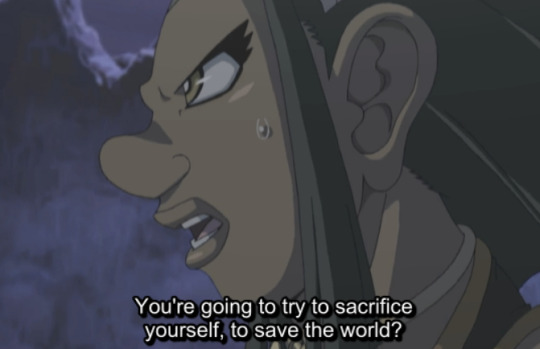
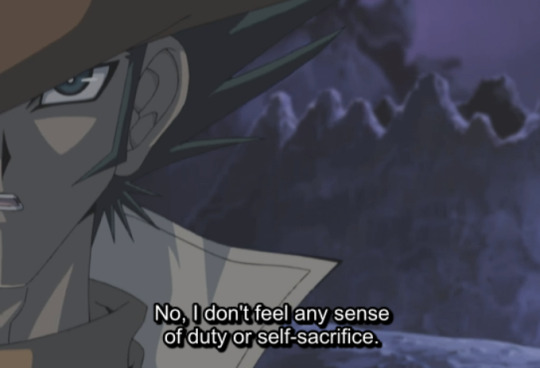
I just want to save my friend. That's all.
This is to me a very compelling setup for the challenge of whether or not Yubel can be saved. Judai's not really saving a helpless victim, he's not acting out of a sense of duty to sacrifice himself for the world, he's being challenged to save someone who suffers from all the same flaws that he does. Judai and Yubel are so similiar at this point it's really just Judai saving himself.
The Dark Deku Arc - Setup
This is the part where I'm actually going to praise MHA. Shocking I know. Season 1 and 2 of Yu-Gi-Oh GX are about 105 episodes in total. The Dark Deku arc begins at about episode 131 with Deku's decision to leave the hospital by himself to hunt down Shigaraki and AFO alone and try to understand villains better.
The 130 episodes up until that point are much better build up, than the first 105 episodes of Yu-Gi-Oh GX. To put it frankly GX is paced like ass. There's far too much filler, and because of that the plot points the anime is trying to make are delivered less efectively. In fact 105 is a good example of what I said above, that ideas are one thing and execution are another.
Season 2 especially is a season filled with good ideas and weak execution due to pacing. Here's one I use as a go-to example. There's a character named Edo Phoenix who's on a quest to find who killed his father. The ending of his plotline is he discovers that in a twist, the man who adopted him is the one who killed his father, and he's been encouraging Edo to investigate because it lets him spy on the police investigation and keep it off his tail.
That's a good twist - however that twist happens in the same episode that Edo's adoptive father is introduced. The audience is given literally no time to even get to know Edo's adoptive father, or get invested in their relationship so the twist doesn't hit at all. A better paced story would show Edo's relationship to his adoptive father early on, get you invested in them, only to pull the rug out from under you so you would feel the shock of that betrayal alongside Edo.
GX establishes its character cast, and yes the filler does give the cast time to breathe and they're all well characterized but because the plot around them is so poorly structured, none of the plot points really hit. Okay, Edo's adoptive dad is evil. Next! You can have good characters, but if you don't put them in a strong narrative framework that challenges them then those characters are just gonna kinda sit there.
The first 105 episodes of Yu Gi Oh GX does succesfully characterize most of the main cast, but it also feels like everyone's just goofing around. In comparison the first 135 episodes of MHA much more successfully builds an escalating conflict. Each new arc either introduces you to a new facet of the world, makes the amin characters more complex, or adds to the conflict.
We basically go from arc 1 "The hero high school is fun" to Arc 2 "The villains are a serious threat" to the Camp Arc "Oh shit, Shigaraki is learning and the villains are getting stronger."
When Bakugo is kidnapped at the end of the camp arc, the tension is ramped way up with the appearance of AFO, and All Might's retirement.
After that point we're introduced to the Overhaul arc, which not only again makes the League of Villains more complex and sympathetic, but also introduces the audience to All Might's more flawed side - the fact that All Might literally worked himself to death saving others and it still didn't work.
Then My Villain Academia -> The Villains are now a threat and they have an army.
Each arc builds on a previous arc, the characters and the world grow more complex, and it feels like you're learning about these complex issues alongside the characters. It just makes Yu Gi Oh Gx look like the silly card games show by comparison, by setting up this very layered world, and conflict, and heroes that challenge the protagonists on what it means to be a hero and what it means to be a victim.
Then all of that great setup.
We are side by side with the proagonist. We, like Deku now want to see if someone like Shigaraki can be saved. We, alongisde Deku want to better understand the villains and learn to see them as people. We want to know if the corrupt hero system can be salvaged.
However, these are too many questions so let's boil it down to two once more, because this is looking at Deku's character.
Deku and Judai are in some ways different as night and day. Deku is an introverted nerd and the victim of bullying, and he starts out with no quirk at all. Judai is a self-confident, charismatic prodigy who instantly seems to charm and befriend everyone around him. Deku desperately wants to be the hero and works his way up there, whereas Judai is just kind of thrown into the school hero because he's the best at dueling.
Judai is kind of a mix of Bakugo and Deku's traits, he's a self confident prodigy who always wins, but he's also someone obsessed with heroes and who has a hero-complex where he's continually forced to save others.
The Dark Deku arc, like the Supreme King Arc looks to take a darker, more introspective look at Deku's character, while also exposing Deku who is a sheltered kid to the a very grey on grey world. It also seeks to deconstruct Deku's suposed "hero complex". Despite the many differences between Deku and Judai I believe the two questions an be boiled down to the same thing.
Is Deku Selfish?
Is Deku's hero complex a bad thing?
These are the questions the series itself is asking in the deconstruction of Deku's character. Deku himself is asking if there's a better way to save villains tha just beating them down or outright killing them, but we'll discuss that later.
Just like Judai there is some setup before this to give a previously very one-note Shonen protagonist mor depth. Deku and Judai are both people who fit the determined, punchy, solve everything fist fight shonen protagonist to a T, on top of being the one to always show up to fight for their friends. Just like in the beginning of season 3, we do have some hints before this that there's something wrong with this attitude. That there's something about Deku that's not entirely there.

There's a flashback of All Might talking with Bakugo where Bakugo discusses that the fact that Deku never takes cares of himself or factors himself into the equation when he always puts others first deeply bothers him and there's "something wrong with it" that's made him always push Deku away.
This flashback also leads into a scene where Bakugo pushes Deku out of the way of one of AFO's attacks, telling him to "stop trying to win this on his own." In an attempt to make Deku see that he's not fighting alone this time.
Deku has also been warned repeatedly about the way his power destroys his own body when he uses it, warnings he's repeatedly chosen to ignore. Saving others isn't just a goal for Deku, you could arguably say it's a method of self-harm and that's what unnerves Bakugo. Bakugo even gave a similiar speech in the past, about how someone like Deku shouldn't take all of the bullying that Bakugo has given him over the years and still try to be his friend afterwards. At this point it's not really like Bakugo's done anything other than tone down the constant insults a little bit, he hasn't apologized or anything but even this early in the manga Deku has a tendency to just let Bakugo's treatment of him go. It's not like they were super best friends forever before the bullying started either despite what the shippers might tell you. Bakugo is saying it's weird that this kid just takes it, and takes it, and takes it without fighting back like he doesn't care about how people treat him and Bakugo is right... that is weird!
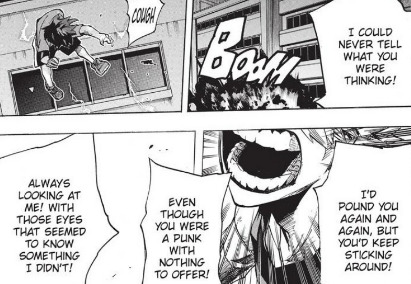
Deku either has such low standards for how he's treated that he just lets Bakugo get away with it, or he just doesn't hold a grudge when he is mistreated because his pain and his suffering just always matters less. Either way it's not healthy, and it could be indicative of a deeper problem hiding behind the surface.
Either way there's setup here, because on one hand you have everyone and their grandma praising Deku for his "drive to save others that eclipses all common understanding."
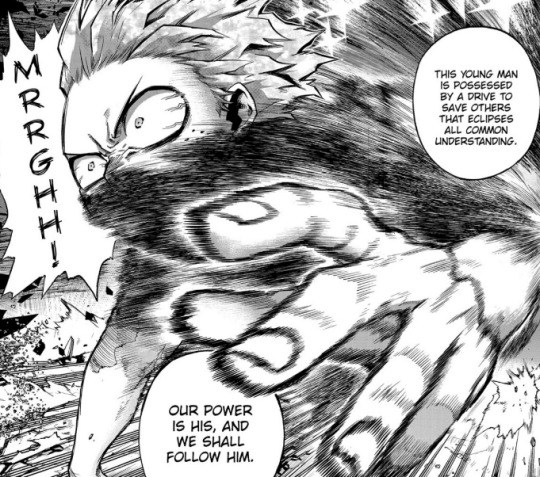
While at the same time he's criticized by Bakugo for having no regard for others. This could be the setup for the character trait that led to his earlier success leading to his downfall later. In Judai's case, everyone praises his purity of heart, but then that purity is later criticized as childishness, naivete and a refusal to grow up.
As for Deku...
How can you protect others if you can't even bother to protect yourself? How can you save others if you can't save yourself? That's the question Touka asked of Kaneki in Tokyo Ghoul when she rightly called out his desire to protect everyone at the Anteiku Cafe as just a roundabout way of getting himself hurt by acting recklessly.
In Kaneki's case he's not trying to protect anybody, he's just picking battles against the doves and getting himself hurt. He's acting out a hero complex in the sense that if he feels like he didn't fight his friends battles for them like Judai then he wouldn't have any friends to begin with. That's why Touka also says "Besides that, everyone doesn't belong to you. You have no business protecting us."
Is Deku fighting for the same reason? Does he harm himself to protect others because he views himself to be worthless and the only way to demonstrate his worth is try and fight to save others?
We don't get an answer for that question. Judai thinks duels are fun, and he's really good at them, and because he's good at dueling he's made friends. He think to keep those friends he has to keep dueling for the sake of others.
Deku's not motivated by the idea of protecting or keeping his friends, that's a secondary motivation. All we have on Deku is that he feels a strong desire to save others, and that he worshipped heroes like All Might growing up but has a naive idea of what a hero is supposed to be. However, his lack of motivation could be the "something that's missing" just like Judai has.
The GX writers did some hardcore digging into Judai's character by focusing on how shallow he was in motivation compared to everyone else, and showing that to be a symptom of his childish naivete.
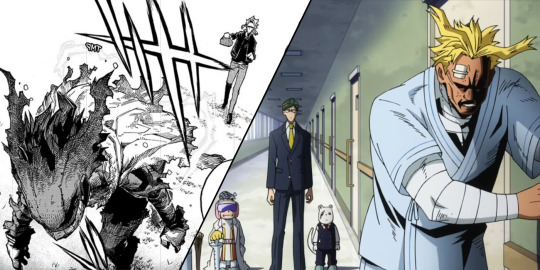
There's also the potential parallel between All Might and Nighteye's breakup, and Deku's decision to leave all his friends behind to hunt for Shigaraki himself.
Even if Deku doesn't have a deeper motivation than just "an unnatural drive to save others" then you could show the effects of Deku walking down the same path that All Might did, the belief that he has to be the one to save everyone singlehandedly and if he rests for a single moment than someone might die, leads to him not only destroying his body, but also doing permanent damage to all of his social relationships.
Even if Deku's motivation isn't too deep, you could still have the traits that led him to earlier success now driving him to ruin as the story punishes Deku for his excessive selfishness.
This is also where we finally get back to Deku's goal of understanding Shigaraki, and contemplating whether or not it's possible to save villains without killing them.
I draw a parallel between this and Judai's enemies calling him out on lacking "darkness of the heart" and that without understanding that darkness he can't win.
Judai's lack of darkness of the heart means two things, he's not mature enough to understand the reason why his enemies are fighting, and he's also not mature enough to se the darkness in his own heart which is why he ends up blind to his own flaws and making pretty severe mistakes later on.
For Deku, it's mainly a lack of understanding of the motivations of the villains he's fighting again, villains he's only ever really beat down with his fists until now.
However, for Deku lacking darkness of the heart you could also re-contextualize that as meaning because of his idealization of heroes he's never once looked at the darker sides of hero society that might have driven people into becoming villains.
Deku's lack of inner darkness may just come from the fact that compared to the villains he's fighting against, he's gotten to live a pampered life. Without understanding that darkness, he can't be a full person because he'll still be a naive sheltered child, and not an adult wise to the way the world works and the moral greys he inhibits. Either way, it's just as necessary for Deku to gain an understanding of "Darkness of the Heart' as it is Judai.

So here's all the setup for the start of Deku's Dark deconstruction arc. As different as these characters and scenarios you can still boil it down to those three narrative questions about Deku / Judai, is there behavior selfish? Are there hero compelexes a good thing? Do they need to understand darkness of the heart?
Before moving on I'm going to summarize Deku's setup as thus:
Deku's actions are selfless.
Deku's motivations are also selfless (a desire to save others).
Deku does not benefit from saving others in any way, if anything he actively harms himself in order to do so.
Bakugo finds this behavior incredibly disturbing.
All Might destroyed his body and burned all bridges because of similiar flaws to Deku.
So the answer to the first question is Deku selflish? No. Is his hero-complex a bad thing? Potentially.
While Deku himself decides that he needs to understand darkness of the heart in order to better understand villains. Deku is actually more set up to contemplate darkness of the heart than Judai is, because Judai charges into the dark world blindly with only the motivation of saving Johan not even caring for Yubel, while Deku has the explicit motivation of trying to understand the little boy inside Shigaraki.
DEKU LEFT THE HERO ACADEMY
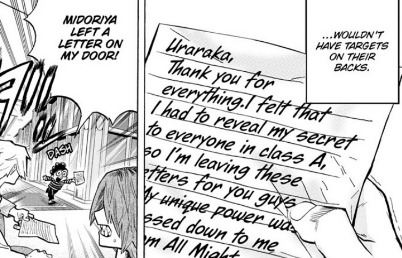
Deku begins the arc by leaving alone to go searching for Shigaraki, with hand-written letters addressed to all of his friends that tell the truth about One for All and also say Goodbye. He makes the deliberate decision to leave them behind so they don't get targeted alongside of him. It's a pretty classical superhero motivation, I need to cut myself out of my loved ones life in order to protect them. Of course this sort of ignores that everyone in his class has super-powers too, but you know heroes they're all such drama queens.
Is this selfish behavior?
This is going to be the only time I'm going to solidly answer yes. Deku clearly did not take his friends feelings into account. His desire to protect them, is more important than their own agency. They also might want to fight alongside him, they'd be upset if they saw him die or get hurt trying to protect them. Deku thinks of his own feelings of wanting to keep them safe and not being able to handle the emotional burden of protecting him, more than he does their own personal feelings.
This is also something that All Might did they permanently burned all of his bridges with his sidekick and friends, and deeply hurt his sidekick who was just asking him to take a break so he did not get himself killed and quit because he didn't want to watch All Might slowly kill himself by inches.
Deku is being selfish here, and later on when he does face his friends he even acts pretty condescending belittling them and insisting they can't fight on their own or keep up with him.
However, I need to ask a secondary question.
Is there any lasting consequences for this selfish behavior?
Besides the fact that it hurt his friends feelings for a little bit, no. I spent a much longer time covering this in Judai's sections because Judai's selfish behavior led to character conflicts. Judai disregarding his friends led to everyone starting to resent him in the Dark World, and their once tight-knit friend group further falling apart.
Judai on three seperate occasions makes impulsive decisions to run ahead without consulting with the group. The second time he outright lies to the group and sneaks ahead without them. THe second time all of his friends are captured when they go after him and try to follow him to give their support because they're worried about him. The third time he makes the decision to run ahead, he knows about the danger they're in and the risk of getting captured and he just blatantly ignores them. When Austin notices they're missing Judai doesn't even go looking for them because they're not a priority at this point - saving Johan is.
This is something that has very real and lasting consequences in the story, they're captured because of his recklessness, and sacrificed in front of his eyes. Even though they technically come back in season 4, the trust between Judai and his friends is all but gone and he's alone for a lot of Season 4.
Judai's decision to abandon his friends has direct and lasting consequences. He is being punished for his hero complex. Running ahead, and fighting alone against the bad guys is what Judai has always done and what's worked before, but now in a more complicated world it's not cutting it and Judai is being challenged for his flaws.
Deku hurts his friends feelings a little bit, but even in that case the focus is on how sad it is for Deku, how hard it must be to be a noble hero fighting alone.

Deku's Mary Jane and Spiderman bullshit never impacts his friends directly, other than the fact that they find it slightly condescending. His "I need to keep secrets from my loved ones attitude" is challenged because his friends want to fight alongside him, but there's never any narrative punishment delivered to him. It's just solved with one fight scene and a character holding out their hands. Whereas, the consequences for Judai's rash actions last two seasons.
I call it "Mary Jane and Spiderman" Bullshit, because Spiderman keeping his identity a secret from all his loved ones is a big conflict in the comics. Something that got Gwen Stacy killed, because Peter Parker never told her his identity in order to protect her, and then that just ended up with Norman Osborne finding out about her anyway and kidnapping and killing her.
You might have heard of the "Death of Gwen Stacy" it's a pretty famous moment in comics. It's also a case where it shows that the Hero's failure to communicate honestly with their loved ones in the name of "Protecting Them" can actually get them killed.
There's even consequences in MHA itself for heroes choosing to sacrifice their personal lives to help complete strangers. Shigaraki literally made a whole speech about it. Kotaro Shimura is traumatized for life over his mother's decision to abandon him instead of giving up on being a hero. Nana Shimura believed she was doing something selfless in sending her child into foster care to keep him out of AFO's clutches, but that was shown to be wrong as AFO just found Kotaro's household and then destroyed him later on in adulthood anyway.
So in the story we are shown scenarios where choosing to abandon your loved ones in the name of "protecting them" can have disastrous and lasting consequences, but as for Deku himself, the decision to leave the school has basically no consequences whatsoever.
Well, Deku making the decision to fight alone is something that might lead to some consequences. After all, Judai's breakdown came about because he always felt the pressure to fight alone and carry everyone's weight on his shoulders until he couldn't.
Perhaps, with Deku fighting alone to protect everyone we'll reach a similiar breaking point. Just as Judai couldn't handle carrying everyone's burdens, looking for Johan, and leading his friends into the Dark World all that the same time and eventually broke down maybe we'll see Deku break down because he just like All Might can't carry the burdens of an entire nation - oh wait nevermind he's working with the Top 3 Heroes.
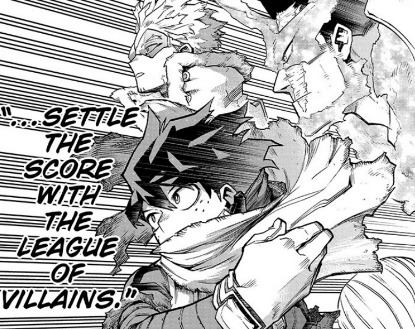
Even the premise that this is Deku leaving the school, to become something like a vigilante wandering the countryside trying to fight AFO on his own is just incorrect because Deku is receiving government assistance right now.
In the Dark World it was really just Judai and his friends, so every single bad decision Judai made had consequences because they were well and truly alone. Deku has backup so he's not even really "alone" in the arc that's supposed to be about him fighting AFO and trying to understand Shigaraki alone.
ALL YOU'LL FIND IS BLOOD AND VIOLENCE
Let's briefly focus on questions two and three, is Deku's hero complex bad, and does Deku need to understand darkness of the heart?
Judai's hero complex was based on the idea that if he wanted to have friends he needed to fight for them and solve their problems for them.
Judai got in such an unhealthy negative feedback loop, that he had to carry his friends burdens in order to maintain his friendships with them, but at the same time he couldn't receive any help from them because he made their friendship all about him carrying their burdens. He was operating underneath an amazing pressure to always win until he lost. The very thing he did to try to maintain his friendships, keeping his friends at arm's length and fighting alone is exactly what ends up driving them away and leaving him alone.
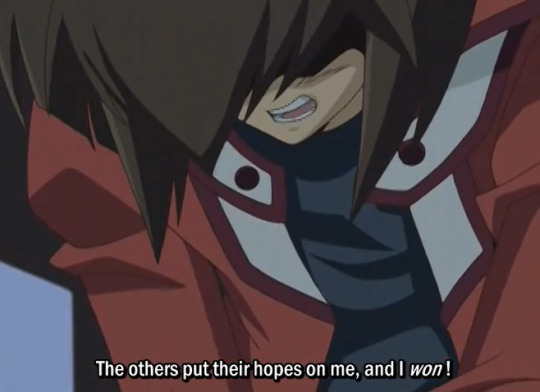
But, still...!
They're all... They're all gone. There really was something missing in me. But what is it? What was missing? What should a duelist burden themselves with?
Judai paradoxically fights alone in order to keep his friend group together, which only ends up with him losing four friends and being abandoned by the rest when they're disappointed for him in his selfish behavior. Judai screams out why, realizing he did something wrong here, that something went wrong because he's been winning duels, he's been fighting the same way he did before only to end up with the worst option possible. The realization that he is truly alone breaks him down entirely.
Judai's hero complex unwravels when simply charging ahead to fight doesn't work for him anymore, because the situation becomes more complicated than that. Darkness of the heart can mean many things. Judai not understanding his own personal flaws. Judai not seeing how his flaws are affecting others. Judai not looking at other people's emotions, he doesn't hear or respond to criticism when his friends start trying to tell him how is selfish decisions making is making them feel.
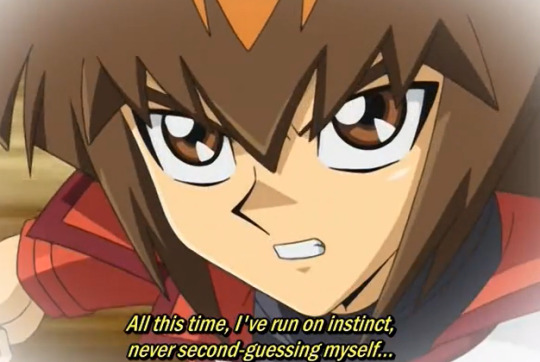
I can't just stay and wait. All this time I've run on instinct, never second-guessing myself. If I just stand still now... I'm sure I won't be able to start running again. And I won't be able to get to Johan.
Judai's hero complex has a clear source - he believes he has to keep running ahead and fighting for his friends the same way he always has in order to keep those friends and if he stops he'll lose everything / succumb to the guilt he now feels about being uanble to save Johan. His Hero Complex also has clear consequences, him running ahead without thinking gets all of his friends kidnapped and used in a sacrifice ritual that could have been avoided if he had made different choices.
Spiderman kills Gwen Stacy because Peter Parker deciding to not tell her about his secret identity to protect her backfired and made her an easy target to the Green Goblin.
Heck, Spiderman's entire character is about how the burden of being Spiderman and his Hero Complex constantly sabotages any attempt he makes at having a personal life. Miguel O'Hara's catchphrase in the incredibly popular Spiderman movie is that "Being Spiderman is a sacrifice" and he's not wrong either.
SO, is the narrative punishing Deku's hero complex in any way?
Well, the one warning he did receive that if he kept fighting he'd lose permanent loss of his arms turns out to not matter anymore because his body is just stronger now.
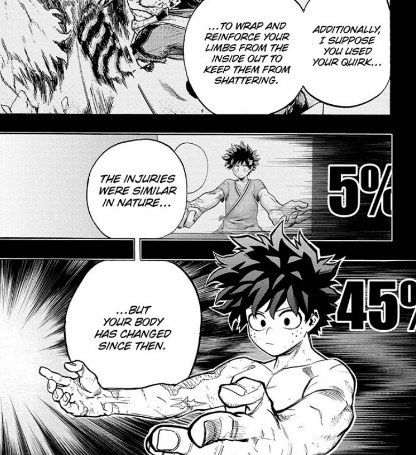
So, even the phyiscal toll of fighting alone that's a consequence for Deku doesn't actually apply here.
I keep talking about consequences but what do I actually mean? Am I talking about strictly punishment? Do bad things need to happen to characters in order to get their lessons?
Not necessarily.
When I say "consequences" I mean in terms of actions always having consequences in a story. The best stories are succinct, that means you basically cut down in as many frivolous details in a story as much as possible so everything that happens onscreen is something that matters and contributes to the whole. Therefore, every action should have a consequence directly seen onscreen in story. Stories are all actions and consequences, the choices the characters make should have direct impact on the plots and the other characters because it makes those choices seem like they matter.
If the story constantly draws attention to the fact that Deku is afraid of ducks, but the story takes place on the moon and there are no ducks living on the moon then that's a wasted plot thread because there are no consequences. If a character does something bad, other characters should discuss it, or it should negatively impact them in some way.
When Judai decides to run ahead without all of his friends for the first time after they all agreed on a plan, the result is the next episode they all start talking about their shared doubts with Judai when he's not around. If they all just swept Judai abandoning them under the rug, then Judai running ahead and leaving the others alone doesn't feel like an impactful character flaw.
There's no lasting consequence for Deku's hero complex. It doesn't drive him to any kind of breaking point like it does Judai.
I think the reason why is because there's no real moment of failure for Deku. When he tries to ask Muscular why he fights, and Muscular rejects him and says that he was just born evil and has no deeper motivations, Deku's not frustrated at all.
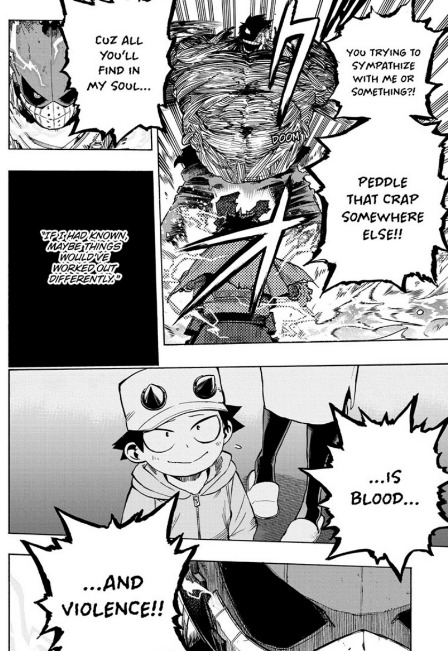
Deku who feels a "unnatural desire to save others" isn't really bothered by the fact that Muscular insists that he can't be saved and that they can only fight. Despite this technically being a failure, Deku has failed to talk a villain down, failed to find a way other than fighting and also failed to understand the darkness in someone's heart it's of little consequence because it's not framed as a failure.
Deku just punches Muscular, back to the drawing board.
There's another manga called Choujin X running right now, where the main character is on a similiar quest trying to see if there's a way they can save the big bad Sora Shihouhin, and when he is forced to fight against a villain who won't back down, de-escalate, or listen to reason he has a complete emotional breakdown.
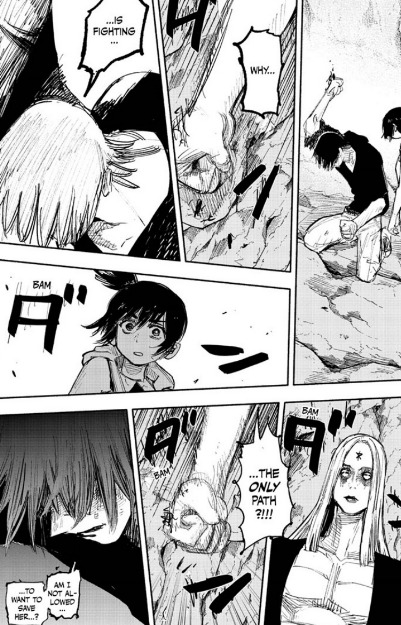
This is the reaction of someone who's genuinly invested in the idea of saving the villain, and frustrated with the reality that he might not be able to save her, that he can't talk to the villains or convince them to back down. Tokio's not even characterized by an unnatural desire to save others like Deku is, so why is he the one breaking down and not Deku someone apparently so selfless that he wants to save the mass murderer that's trying to destroy society?
If Deku's desire to save others is so strong why doesn't he show frustration at being unable to talk down, or understand Muscular?
Judai is stuck in a negative feedback loop where he's forced to fight for others, because he believes he has no worth to his friends otherwise. All we're told of why Deku feels the need to save everyone around him is that he's just like that, he just feels like saving everyone no matter who they are the moment they come into view.
If we're choosing to characterize Deku that way, then number one he should be attempting to save everyone, and number two the stress of having to save everyone is something that should get to him. His "Hero Complex" should be what's breaking him down at the moment. The unnatural desire to save everyone around him that led him to so much success should be what's punishing him this arc.
Judai felt pressure from two aspects, first the pressure to carry everyone's burdens, and second the lack of understanding of darkness of the heart. Unlike Judai who doesn't want to understand darkness and who avoids it as long as possible, Deku goes into this arc actively seeking to understand how his villains think.
Deku and Judai also suffer from a lack of darkess in their own hearts. This leads to them having empty motivations. Judai has a childish desire to enjoy fun duels. Deku has a childish desire to save everyone. Neither of them have tried to grow or change or even question those motivations in any way and because of that they're stunted people.
Judai doesn't know why he fights. He doesn't question why he fights. He just takes on the burdens of others to give him something to fight for. This all together leaves Judai blind to his own personal darkness, and also because of that blindness he can't grow in any way because he never evaluates himself, he never looks at himself and tries to change.
When he's on his knees and at his breaking point he screams at the top of his lungs, "WHY? WHAT AM I MISSING? WHAT DID I DO WRONG?" simply because Judai's never thought about these things.

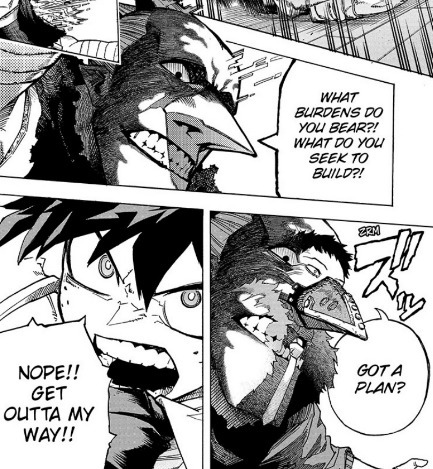
Deku's asked these same questions both in the Dark Deku arc, and hundreds of chapters later he's asked what he's planning on doing as a hero in order to make things better and Deku never materializes an answer.
Pre-Dark Deku Arc, during Dark-Deku Arc and Post Dark Deku arc, Deku always solves his problems by recklessly jumping in and saving others. There's never any point where he's punished or criticized for this behavior in any significant lasting way. He never has to self reflect and develop a reason on why he wants to save others, or eve think about how he's going to save others, he can just keep acting as the rash, impulsive hero.
Judai and Deku are both characters who are empty, and lacking in motivation but Judai is ruthlessly criticized for that until he reaches his breaking point and is forced to look at his motives.
This once again comes from a lack of failure on Deku's part. Deku never fails the way that Judai does. There's a scene where you could have easily had Deku fail. The entire Nagant vs. Deku fight where Deku fails to give her any substantive answers to his questions.

Imagine if Deku's simple philosophy of always extending a helping hand failed here. Imagine if Deku actually got deeply ivnested in the idea of saving Lady Nagant, and did his beset to talk and reach out to her but his answers weren't enough and because of that she just chooses something like suicide. Imagine he has her by the hand, and she's dangling off of the roof and he thinks that his impressive move to save her should have been enough - he's reached out a hand like always. He thinks this should have won her heart over, by showing her that someone still cares in all of her despair.
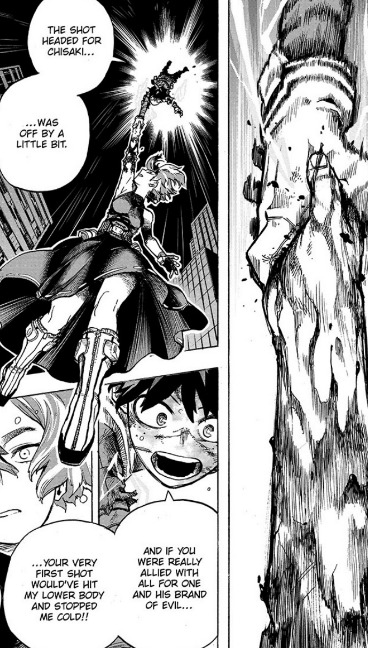
Then, Nagant in one final spiteful move lets go. The person he heard her entire backstory, the person maybe he once was a huge fan of her when she wasa hero, the person he wants to save the same way he wants to save Shigaraki chooses to let go and fall to her death because dying would be better than living in whatever kind of corrupt world that Deku is trying to build.
This could be Deku's Gwen Stacy moment. Spiderman carelessly webs Gwen Stacy whe she's falling to catch her and for a moment he thinks he's saved her because he's overconfident and has caught people falling like this a thousand times, only to find out he's snapped her spine. His overconfidence, his hero complex making him believe everything magically would work out led Gwen Stacy to her death. This could show the simple act of just offering a hand out to someone in need isn't enough, without empathy and understanding.
Instead, AFO just blows Nagant up in Deku's face.
Except, that isn't even a failure bcause Nagant turns out to be just fine! There's no point in blowing up Nagant except for the spectacle of it, because she turns out to be fine five minutes later and even shows up to fight in the next arc.
There's no consequencs to anything that happens in this scene. Deku doesn't suffer any consequences for being blind to the faults of society. (He's working right alongisde a killer cop just like Nagant and he doesn't even care.) Deku isn't forced to reflect on what saving people or making society better would even mean. He also isn't punished for his lack of understanding the way that Judai is.
Afterwards, Deku denies help to a very mentally-ill Overhaul, who is apparently not one of the villains that Deku wanted to save. There's a whole buch of asterisks on that "Deku wants to save everyone***" goal. This also isn't framed or used to paint Deku in a bad light because Overhaul is unworthy of salvation in Deku's eyes for hurting Eri.
Is this action part of an arc? Is Deku reaching his limit with trying to sympathize with villains only to see people like Overhaul and Muscular fighting him every step of the way and telling him they don't want to change?
Nope, this scene is never brought up again.
Deku never fails, and he never does anything wrong. Even when there are situations where you could argue he does do soemthing wrong, like denying the armless, mentally ill Overhaul help - he's not painted as being in the wrong.
The entire arc is supposed to be about criticizing the protagonist for their hero complex, and their lack of understanding of the darkness of the world but for Deku there's no criticism to be had here.
Compare this to the sacrifice ritual in the Supreme King Arc, where not only does Judai fail to save his friends, but the friends that survive ruthlessly tear into him aftewards for his selfish behavior. THe actions of one protagonist matter, have consequences in the story and are criticized. The actions of another protagonist have no real consequences and are never criticized.
The whole mansion blows up and... nothing happens. No one's injured in the explosion. It may as well have not happened in the story because there are no consequences for Deku just continually choosing to blindly run ahead like his hero complex tells him to.
There's evena moment where Deku winds up in a similiar situation to the dark ritual. After receiving information from Nagant, he blindly wanders into a mansion in Haibori woods believing it to be AFO's base, only to find out it was a trap and AFO was waiting for him to blindly charge in all along.
THAT'S WHAT MAKES US HEROES AND VILLAINS
This is where I'm going to talk about another big similarity between Deku and Judai, and also the biggest point of divergence in the Dark Deku and Supreme King Haou arcs.
Deku and Judai are both character foils with Shigaraki and Yubel respectively. This is where I'm going to praise MHA again, surprising everyone.
The foiling between Shigaraki and Deku is masterful. They both started out in relatively the same place, as boys with dreams to become heroes who were softly told no by their parents. Tragedy struck Shigaraki and he killed his family on accident and wound up alone wandering the street for days until he was found by AFO.
They're both the students of the greatest hero and villain of the last generation. They both end up being surrounded by a group of close Nakama that they want to protect. They're both continually challenged to grow up, and show how they're going to be better than their predecessor for the hero and villain sides respectively. They both have to prove they are worthy successors. Shigaraki has all the heroic spunk and determination that Deku has but on the villain's side, and while Deku loves heroes, Shigaraki is hero society's critic wants to bring down the hero system that didn't save him.
You get the feeling that Shigaraki really is Deku just in a different situation, a same person on the opposite sides of the conflict kind of character foiling.
As the biggest Yubel stan here, in some ways the foiling for Shigaraki works better than the foiling for Yubel because Shigaraki isn't just Deku's foil, he's the foil for all of society. Yu-Gi-Oh Gx takes place in a society run where everything centers around card games, it's not really that deep. In My Hero Academia you have that 100 episodes of great setup where Deku is not only learning to look at the darkness within himself, but also the darkness within hero society around him.
Judai's narrative as much as I love it, is entirety about Judai.
Not only could Dark Deku arc develop Deku's character, it could also say something deeper about the world it's taking place it, because Deku has all these connections to Shigaraki, who also kind of represents the orphaned boy failed on all levels by the society around him.
Shigaraki is the shadow of -> Deku, but also Shigaraki is the shadow of -> all of society.
Yubel is the shadow of -> Judai, and only relates to Judai's personal growth.
Yubel is Judai's personal villain, and was created by his actions as a child. His decision to abandon Yubel into space, led to Yubel being tortured and their later madness.
Yubel is also Judai's shadow. They carry all the same flaws, but those flaws are obvious in Yubel and repressed in Judai. Yubel's belief is that Judai is someone who purposefully enjoys hurting their friends, and that's how he shows his love. While that's twisted it's not hard to see how Yubel came to that conclusion. After all, Yubel loved Judai so much only for Judai to abandon them and turn a blind eye to their suffering. In the Dark World, Judai abandons his other friends continually in order to search for Johan, and they wind up suffering too.
While Judai doesn't sadistically enjoy hurting others as Yubel put it, there's an element of truth to Yubel's criticism. Judai does abandon people, Judai isn't as empathic as he seems to be. When Judai is subjected to the same kind of isolation and abandonment that Yubel has endured for the past ten years, Judai loses his mind a whole lot quicker and starts lashing out at everything around him the same way Yubel has. Judai without the love of his friends starts to hurt everyone around him in his lashing out, the same way that Yubel desperate for love starts to inflict pain on the people she loves. Even before the ritual happened, Judai was unwittingly hurting his friends with his own selfish behavior.
Yubel's stated criticism is "of Judai is "Anguish and sorrow born from loneliness. That is the nature of love as you taught it to me" and further beyond that "When you forgot about me, I suffered. It's hot. It hurts. I am in pain. Why? You know how much I love you? Why did you do this to me, Judai? In that moment I realized that was how you showed love. Because you loved me, you hurt me and made me suffer."
That sounds crazy, but hasn't Judai been hurting the people he loved for his own selfish reasons this entire arc? Is it that crazy then to conclude that neglect and abandonment must be how Judai treats everyone he loves, so surely he loves me.
One of the biggest criticisms of this arc is how Judai's behaviors impact his relationships, so of course his most personal villain and foil is his jilted ex nonbinary dragon lover. On a less joking note, when Yubel was displaying troubling behavior as a child, Judai's first response was to abandon them. Which is ironic for someone like Judai so paralyzingly afraid of being abandoned that he became everyone's workhorse and worked himself to death solving their problems for them. Who when abandoned by those friends finally, snaps just as hard as Yubel did when they were abandoned.
Do you see the parallel I'm drawing here? Judai is slotted into the spot of the protagonist who's friends with everyone he meets, who loves and fights for his Nakama. Yet under closer scrutiny he's shown that he doesn't really understand what love or friendship is or how to give and receive love from others in a healthy way. His antagonist is his former childhood best friend, who is obsessed with love and demands that Judai love them back. Judai's lack of understanding of relationships and love takes a dark twist with Yubel, their shadow, foil and antagonist.
These are once again very personal challenges to Judai, society doesn't really factor into this equation. Though, Judai is somewhat challenged as a hero because there's an irony to Judai plunging into the world to save his best friend Johan who he's known for like three weeks, but not really lifting a finger to save the antagonist of the arc Yubel who he's known since childhood and is personal responsible for putting through torture.
That hypocrisy there too, is a personal challenge to Judai that paints him in a less heroic light. He wants to save Johan and ignore Yubel because it's easier, because saving Johan relieves him of his guilt. He doesn't even know what to do about Yubel, so he doesn't try and falls back on his previously established behavior of playing the hero.
The hero is really just a mask for Judai at this point, something the story has ripped right off of his face by the time it comes to face Yubel.
There are two ways in which Yubel serves as an ultimate foil to Judai.
Yubel acts like a callout post to all of Judai's flaws
Yubel represents a dark path Judai could have taken.
This second one is what Shigaraki and Deku have in Common with Judai + Yubel. There's something deeply tragic about the idea that while Deku was making friends, getting taught by a loving teacher like All Might, Shigaraki was all alone being pushed by a ruthless manipulator like AFO into becoming the worst villain.
Judai and Yubel's lives follow the same tragic parallel path. They began in the same place as childhood friends, but after abandoning Yubel, Judai spent the next ten years growing up, making friends in a healthy and safe envirnoment while Yubel the one who was abandoned was alone in space desperately crying for Judai to come save them only to be ignored because Judai has long forgotten them.
However, there's a striking difference there too. Yubel is created directly by Judai's neglect and actions. Whereas Shigaraki is created by the neglect of all of society, it's not Deku's fault directly.
#1 Shigaraki acting as a callout post to Deku's Flaws
However, this is where Shigaraki's callout post comes in. Shigaraki gives a long speech on how the existence of heroes itself, creates villains like him.
"You heroes pretend to be society's guardians. For generations you pretended not to see those you couldn't protect and swept their pain under the rug. It's tainted everything you've built. That means your system's all rotten from the inside with maggots crawling out. It builds up little by little, over time, you've got the common trash all too dependent on being protected. And the brave guardians who created the trash that need coddling. It's a corrupt, vicious, cycle. Everything I've witnessed. This whole system you've built has always rejected me. Now I'm ready to reject it. That's why I destroy. That's why I take power for myself. Simple enough, yeah? You don't understand because you can't understand, that's what makes us heroes and villains."
To break it down simply, heroes look away from the faults in their society, they intentionally ignore the people they cannot save, and when those people turn into villains the heroes beat them down hard. The villain attacks then convince the common people of the need for heroes, and the cycle perpetuates itself. This is all powered by the people's blind, uncritical faith in heroes.
Deku is a person who has that same blind, uncritical faith in hereoes, and until this point has never thought of Shigaraki as anything more than a villain to be punched until he stops. Which is why this is still a callout post that applies to Deku, because Deku's blind admiration for the Hero System is part of the problem that enables the very flawed hero system.
Deku does not understand darkness of the heart, therefore Deku does not understand that heroes could possibly be bad, and he could possibly be supporting a bad system until he's slapped in the face with it.
However, is there a lasting consequence for Deku's blind support of the hero system?
Nope.
I just described up above what could have been a consequence, if Lady Nagant refused to have faith in Deku since he didn't back his words up with action.
Deku also clearly does not want to break away from the corrupt hero system that created Shigaraki, because the heroes that he brought along to fight with him are Endeavor, Hawks and Jeanist, a child abuser, a state sponsored murderer, and a guy who makes bad puns. He doesn't change any of his bahavior that enables the corrupt system to stay in power.
Not teaming up with the Top 3 heroes, and deciding to go full vigilante would have at least have been breaking away from that system.
This circles around to a big underlying problem in this whole arc in that Deku isn't really doing anything different from what he was doing before, and he's not punished for his character stagnancy either.
So we're left with.
#2 Shigaraki represents a dark path that Deku could have Taken
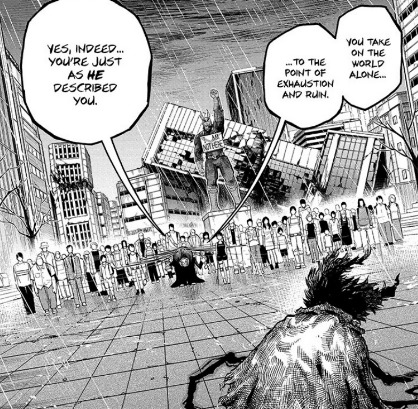
This is where Judai / Yubel succeeds and Shigaraki / Deku falls flat on its face.
When pushed to his absolute limit after failing repeatedly, Judai snaps. With no friends left he decides that all that matters is power. This path seems natural for him because we've already seen what being abandoned and left alone can do to a person and how it twisted Yubel. The story hints again and again at Judai's blood knight tendencies, and that he thinks the only thing he has of value to offer others is strength by fighting for them.
He loses his friends and the fighting is all he has left.
At the point of despair he decides to just embrace power. If he cares about nothing more than strength, at least that will give him some sense of control over his life after the out of control tragedy that happened to him.
"Yuki Judai. In order to defeat evil, one must become evil. In a world with the law of the jungle at work, one must rule with power."
"Power? I don't have that kind of power."
"In your hand lies the super polymerization card. Defeat any spirits who may oppose you, and combine their lives into it to perfect the card."
Supreme King is just a villain persona that Judai adopts to as a protetive blanket for all the hurt and pain they've gone through, just like ding, ding, ding, the villain persona Shigaraki Tomura is for Shimura Tenko.
Judai snapping under such intense pressure shows us that if even the faultless hero can snap, then how much can we blame the villain for snapping under similar circumstances? Maybe the reason both the hero and the villain fell is because they're both equally human and to fall down is human.
Deku never falls down as hard as Judai does. He doesn't even fall down and scrape his knee. There's no instance where he fails to save anyone. There's no instance where his actions hurt anyone. There's no instance where he takes things too far and hurts a villain. I kow it's unlikely for Deku to turn into a villain, but he could have at least gotten so frustrated he turned into a punisher style vigilante! Is that too much to ask?
There's not even a single moment where Deku goes too hard in a fight and injures or even kills a villain. They could have pulled an "I thought you were stronger" moment like in Invincible.
I don't know why this is called the Dark Deku arc because there's no darkness in Deku's heart for him to exploit, nor is he actually called to better his understanding of the darkness in others hearts. Judai understands Yubel's darkness because by the end of his personal arc he's been there, he's not the hero he's the atoner. He can either punish Yubel, or hold a hand out to help Yubel atone.
Deku's arc might as well be called the "My Little Pony Friendship is Magic Arc" because he never does or confronts anything dark. His worst crime is not showering. All that isolation and his repeatd failures in hunting AFO down should have worn Deku down, but it didn't because he's just that special of a boy!
Deku's hero complex also is completely uncriticized from beginning to finish. Judai's hero complex is an unhealthy behavior that utterly destroys him. Deku's hero complex is a job interview flaw.
FRIENDSHIP IS MAGIC
Just to hammer my point in I'd like to compare these two scenes. One is in the middle of the Supreme King Arc, the sacrifice ritual scene where all of Judai's friends are blaming him for the fact that they're about to be sacrificed while he's still trying to save them.
The second is the climax of the Dark Deku arc, where all of Deku's friends are showing up to fight him and convincing him to accept their help.
Just look at how vastly different these two shows treat their shonen protagonists when it comes to his flaws.
For the ritual sacrifice scene. This is immediately after Manjoume wakes up to find that he has been chained and kidnapped with Judai standing right there.
Judai: Sit tight! I'll save you soon!
Manjoume: Wait, is he dueling? JUdai you damned idiot! Weren't you going to save Johan with us!? Getting yourself all flared up. You didn't even stop to think about us at all, did you?
Judai: That's not it.
Manjoume: That's just how you are! You were the only one in your kingdom from the get-go. We were the idiots for getting all motivated with you and feeling some sense of friendship with you being like that!
Then Judai watches helplessly as Manjoume dies. His other friends don't fare much better.
Kenzan: Big Bro? Why'd you want to save Freed's comrades when it meant sacrificing us-don!?
Judai: You're wrong. That's not it.
Fubuki: It's painful. This pain isn't just physical. It's the pain of a friends' betrayal that I have tearing my soul. apart.
Asuka: I'm being betrayed and sent away by you. To think that I'll have to bear a sadness like this.
All of Judai's friends die spitting on him and telling him what a terrible friend he is and that this is all his fault. Which it is, because his decision to abandon them got them captured and led up to the sacrifice ritual.
Now, what scathing criticisms do our heroes have to give Deku after he left them all behind to fight Shigaraki alone?
Denki: Midoriya! We get that all for one is really importnat but you got something even more important in your life! Me and you we aint'g otta ton in common, but you're still a friend! Even if we gotta force this friendship down your throat.
TodorokI: What a look you have on your face. Is this resposnibility so much that you can't let yourself cry? Seems like a burden you should share with the rest of us.
Uraraka: The thing is Deku, we don't want to be protected by you and reject who you are and what you're doing, we just want to be with you (this part is narration).
Deku is told that none of his friends are mad, they want to be by his side no matter what, and that it's okay for him to cry.
I should also mention how underdeveloped this supposed nakama group is in the manga itself. The entirety of Season 3 of GX is tha the bond between Judai and his friends are more shallow then it appears, but he's also spent two whole seasons bonding with a group that consists of: Asuka, Sho, Kenzan, Fubuki, Manjoume. That's six people total including Judai who serve as is primary friend group. Their friendship is more unhealthy than it appears, but Judai has spent the past two seasons hanging out with one small friendgroup.
Meanwhile the entirety of Class 1-A shows up to tell Deku how much they love him and how much he means to them, and Deku's hung out with maybe like... four of them?
You have one bond shown to be how shallow it is, and one shallow bond treated like it's the deepest, most loving friend group in all of fiction. Deku doesn't even receive some lgiht criticism for how inftantalizing it was for him to abandon them for their own protection, because no one resents Deku or is capable of holding any negative or critical emotions towards him whatsoever. He's just told how much everyone loves him and wants him to come home.
And yes, Judai also does get two characters sacrificing themselves to try to reach him when he's the Supreme King.
However, as I stated above Jim sacrifices himself to help Judai because that's who JIm is as a person. Austin does it after Jim fails, both to honor his friendship with Jim, and also because of someone who got scared and ran he feels like he has to confront the darkness of the heart.
Jim and Austin O'brien's sacrifice is also a sacrifice. They died trying to save Judai, and Judai has to wake up with the knowledge that not only did he kill a bunch of people in his quest for power, he killed two more friends who were only trying to help him.
At the end of the arc, Judai has woken up with the knowledge that he has done bad things that can't be taken back and he's barely better than Yubel at this point.
At the end of the Dark Deku arc, Deku gets a speech from Uraraka about how amazing and selfless he is, and how he never gives up and how he always pushes forward, and how everyone at the UA shelter should appreciate him more.
The Supreme King arc exists to criticize Judai. The Dark Deku arc does nothing but flatter Deku from beginning to end.
Judai's hero mask is ripped off and he's forced to be a person. Deku's hero mask stays on, his hero complex is unchallenged, and he's praised for being teh greatest hero evarz.
I often get accused of not liking MHA simply because I expect it to be a different story than what it is. That I want it to be darker, when it's a more optimistic shonen manga.
However, here's my secret. I hate edgy superheroes. I don't like watching stuff like The Boys because it gets too dark for me. The oly reason I read invincible is because my friend told me that Omni-Man got a redemption arc. My favorite DC Superhero is Superman. My favorite Superhero of ALL TIME is Spiderman.
The thing about Spiderman though, is that it is hard to be Spiderman. The entire point of Peter Parker's character is that he has a terrible work/life balance and constantly loses people around him because being Spiderman is a sacrifice. The story doesn't bend over backwards to praise Spiderman as being a selfless hero, in fact it points out what a loser he is constantly. Peter Parker's friends are always frustrated with him and he's a wreck of a person.
Yet, the fact that being Spiderman is such a sacrifice and he keeps choosing to make it, shows what kind of person Peter Parker is, and that's just a person who does whatever he can to help out.
Even Peter Parker, the nicest, most well-intentioned boy ever has the Symbiote arc. One of the most famous arcs in comics dealing with Peter is when he lets Venom graft onto his suit, and even though the symbiote makes him violent, and makes his behavior change he spends the longest time not wanting to peel it off because the power boost the symbiote suit gave him made his life that much easier.
Dark Deku is an obvious reference to the Venom Suit, but a completely shallow reference because Dark Deku acts exactly the same as regular Deku the only reason he looks like that is he forgot to take a shower.
Superhero stories don't need to be Dark Deconstrutions, but they do need to be SOMETHING. They need to say something about the character. The problem with the Dark Deku arc isn't that Deku didn't experience a villain arc.
It's that nothing of consequence happened in the entire arc. Nothing changed. The story asked us if Deku's hero complex was a bad thing, and then it didn't deliver any answer. The story asked us if Deku needs to understand darkness better and then didn't answer that.
These are ideas that the audience promised were going to get answered. We were told Deku was going to get his development this arc that he was going to be pushed to the edge. The entire premise of this arc was that it was supposed to better help Deku understand Shigaraki and Hero Society only for Deku to not learn about either of those things.
Deku's learned nothing. We've learned nothing. Nothing has changed in the story itself. The only thing we've accomplished was wasting a lot of time that we could have been using watching Yu-Gi-Oh GX!
#mha meta#ygo gx meta#yu gi oh gx#yuki judai#judai yuki#supreme king haou#supreme king jaden#supreme king judai#yu gi oh gx meta#dark deku#ygo#ygx meta#ygo meta
275 notes
·
View notes
Text
Ten must-read books for writers (or anyone, really.)
By Writerthreads on Instagram
Obviously this list is highly subjective and based on my research and personal experience. Please share your favourite books as well!!
1. To the Lighthouse by Virginia Woolf
Woolf is the queen of the stream of consciousness and a master at diving into characters' inner thoughts, conveying complex emotions, themes and perspective. Her prose is breathtaking, her character memorable.
2. Beloved by Toni Morrison
Morrison tackles difficult themes with poise like no other, diving into topics like grief, trauma, and identity. Read this book to learn how to develop multi-layered narratives whilst maintaining perfect pacing and a intricate narrative structure.
3. The Great Gatsby by F. Scott Fitzgerald
A masterpiece. Sharp social commentary, eloquent prose and vivid imagery... what more can you want from a book? Every word was chosen for a purpose, and it shows the importance of restraint in writing.
4. The Lord of the Rings by J. R. R. Tolkien
Tolkien's legendary fantasy world-building makes his series a staple in fantasy literature. The geography, cultures and histories in his works are well-crafted. Anyone trying to build a complex world can learn from from this series.
5. Mrs. Dalloway by Virginia Woolf
Our second Woolf classic in this list! Mrs. Dalloway is a masterclass of a perfect character study. Woolf weaves different viewpoints intricately, capturing the essence of human experience.
6. Pride and Prejudice by Jane Austen
Austen character development is legendary, showcasing complex, evolving characters like Elizabeth Bennet and Mr. Darcy. The novel’s witty dialogue show insight into personality and societal norms, and her narrative voice and well-structured plot keeps readers hooked to the very end.
7. Never Let Me Go by Kazoo Ishiguro
Ishiguro’s novel presents a quietly devastating exploration of memory, identity, and humanity through a dystopian lens. The subtle, restrained prose and profound emotional impact illustrate how to weave complex themes into a seemingly simple narrative.
8. The Seven Husbands of Evelyn Hugo by Taylor Jenkins Reid
This book made me cry so very hard. The author explored themes like identity and fame, while creating an engaging and multi-layered plot that had me hooked. Reid’s vivid prose showcases techniques for creating emotionally resonant and storytelling that allows readers to feel for the characters.
9. One Hundred Years of Solitude by Gabriel Garcia Marquez
Márquez’s masterpiece provides a gorgeous, profound exploration of magical realism. Its intricate narrative and richly imagined world blends fantastical elements with real-world themes into something unique and breathtaking.
10. Wuthering Heights by Emily Bronte
Brontes exploration of dark themes, framed within a dark and brooding narrative, makes it the quintessential gothic read. It's emotionally intense, complex in structure, and definitely memorable, perfect for any budding writer dabbling in dark academia, modern gothic literature, horror, etc.
And here's my rather shoddy list from a non-English major who reads too much! And Sorry for the lack of accents on the required letters, I haven't figured out how to add them on my laptop. Please give me a general opinion on my book recs and whether they're good, or if you have more suggestions! Lots of love.
#books#book recs#booklr#writing#writers on tumblr#writing tips#writing advice#teen writer#writeblr#writers#writing inspiration#creative writing#virginia Woolf is a god#mr darcy is the best love interest in romance history#books and libraries#reading#book reviews
121 notes
·
View notes
Text
Film Grammar for Simmers
What is film grammar?
"Film grammar" refers the unstated "rules" of editing used in movies and TV. Different types of shots have different associations and are used by editors to convey different types of information to the audience. Many of these principles were first described in the early 20th century by Soviet directors, but they're used consistently across genre, medium, and even language: Bollywood musicals, English period dramas, Korean horror movies, and American action blockbusters all use many of the same techniques.
Because these rules are so universal, virtually everyone has some internalized understanding of them. Even if they can’t name the different types of shots or explain how editors use images to construct meaning, the average person can tell when the “rules” are being broken. If you’ve ever thought a movie or episode of TV was confusing without being able to say why, there’s a good chance that there was something off with the editing.
Learning and applying the basics of film grammar can give your story a slicker and more-polished feel, without having to download shaders or spend hours in photoshop. It also has the bonus of enhancing readability by allowing your audience to use their knowledge of film and TV to understand what's happening in your story. You can use it to call attention to significant plot details and avoid introducing confusion through unclear visual language.
Best of all, it doesn't cost a dime.
The basics: types of shots
Shots are the basic building block of film. In Sims storytelling, a single shot is analogous to a single screenshot. In film, different types of shots are distinguished by the position of the camera relative to the subject. There are three big categories of shots, with some variation: long shots (LS), medium shots (MS), and close-ups (CU). This diagram, created by Daniel Chandler and hosted on visual-memory.co.uk illustrates the difference:
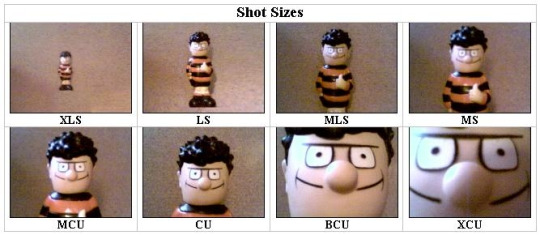
Source: The 'Grammar' of Television and Film, Daniel Chandler, visual-memory.co.uk. Link.
In film, scenes typically progress through the different types of shots in sequence: long shot, medium shot, close-up. When a new scene begins and the characters arrive in a new location, we typically begin with a wide establishing shot of the building’s exterior to show the audience where the scene will be taking place. Next comes a long shot of an interior space, which tells the where the characters are positioned relative to one another. The next shot is a medium shot of the characters conversing, and then finally, a close-up as the conversation reaches its emotional or informational climax. Insert shots are used judiciously throughout to establish themes or offer visual exposition.
Here's another visual guide to the different types of shots, illustrated with stills from Disney animated films.
This guide is almost 2,000 words long! To save your dash, I've put the meat of it under the cut.
Long shot and extreme long shots
A long shot (sometimes also called a wide shot) is one where the entire subject (usually a building, person, or group of people) is visible within the frame. The camera is positioned far away from the subject, prioritizing the details of the background over the details of the subject.
One of the most common uses of long shots and extreme long shots are establishing shots. An establishing shot is the first shot in a scene, and it sets the tone for the scene and is intended to give the viewer the information they’ll need to follow the scene: where a scene is taking place, who is in the scene, and where they are positioned in relation to one another. Without an establishing shot, a scene can feel ungrounded or “floaty.” Readers will have a harder time understanding what’s happening in the scene because on some level, they’ll be trying to puzzle out the answers to the who and where questions, distracting them from the most important questions: what is happening and why?
(I actually like to start my scenes with two establishing shots: an environmental shot focusing on the scenery, and then a second shot that establishes the characters and their position within the space.)
Long shots and extreme long shots have other uses, as well. Because the subject is small relative to their surroundings, they have an impersonal effect which can be used for comedy or tragedy.
In Fargo (1996) uses an extreme long shot to visually illustrate the main character’s sense of defeat after failing to secure funding for a business deal.The shot begins with a car in an empty parking lot, and then we see the protagonist make his way up from the bottom of the frame. He is alone in the shot, he is small, and the camera is positioned above him, looking down from a god-like perspective. All of these factors work together to convey his emotional state: he’s small, he’s alone, and in this moment, we are literally looking down on him. This shot effectively conveys how powerless he feels without any dialogue or even showing his face.
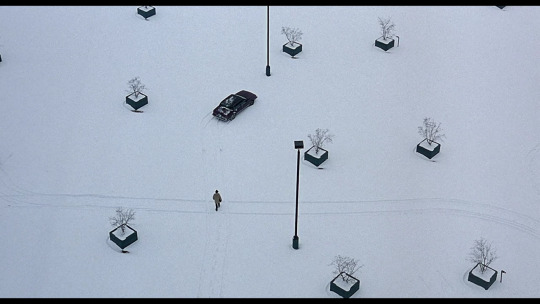
The same impersonal effect can also be used for comic purposes. If a character says something stupid or fails to impress other characters, cutting directly from a close-up to a long shot has a visual effect akin to chirping crickets. In this instance, a long shot serves as a visual “wait, what?” and invites the audience to laugh at the character rather than with them.
Medium Shots
Medium shots are “neutral” in filmmaking. Long shots and close-ups convey special meaning in their choice to focus on either the subject or the background, but a medium shot is balanced, giving equal focus to the character and their surroundings. In a medium shot, the character takes up 50% of the frame. They’re typically depicted from the waist-up and the audience can see both their face and hands, allowing the audience to see the character's facial expression and read their body-language, both important for interpreting meaning.
In most movies and TV shows, medium shots are the bread and butter of dialogue-heavy scenes, with close-ups, long shots, and inserts used for punctuation and emphasis. If you’re closely following the conventions of filmmaking, most of your dialogue scenes will be medium shots following the convention of shot-reverse shot:
youtube
To keep long conversations from feeling too visually monotonous, consider staging the scene as a walk-and-talk. Having two characters move through a space can add a lot of dynamism and visual interest to a scene that might otherwise feel boring or stiff.
Close Ups
Close-ups are close shots of a character’s face. The camera is positioned relatively near to the subject, showing just their head and shoulders. In a close-up, we don’t see any details of the background or the expressions of other characters.
In film, close-ups are used for emphasis. If a character is experiencing a strong emotion or delivering an important line of dialogue, a close-up underscores the importance of the moment by inviting the audience to focus only on the character and their emotion.
Close-ups don’t necessarily need to focus on the speaker. If the important thing about a line of dialogue is another character’s reaction to it, a close-up of the reaction is more effective than a close-up of the delivery.
One of the most iconic shots in Parasite (2019) is of the protagonist driving his employer around while she sits in the backseat, speaking on the phone. Even though she’s the one speaking, the details of her conversation matter less than the protagonist’s reaction to it. While she chatters obliviously in the background, we focus on the protagonist’s disgruntled, resentful response to her thoughtless words and behavior.
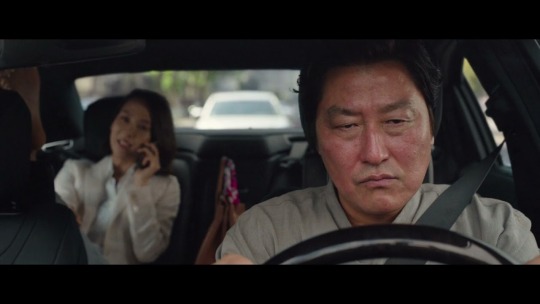
In my opinion, Simblr really overuses close-ups in dialogue. A lot of conversation scenes are framed entirely in close-ups, which has the same effect of highlighting an entire page in a textbook. The reader can’t actually tell what information is important, because the visuals are screaming that everything is important. Overusing close-ups also cuts the viewer off from the character’s body language and prevents them from learning anything about the character via their surroundings.
For example, a scene set in someone’s bedroom is a great opportunity for some subtle characterization—is it tidy or messy? what kind of decor have they chosen? do they have a gaming computer, a guitar, an overflowing bookshelf?—but if the author chooses to use only close-ups, we lose out on a chance to get to know the character via indirect means.
Inserts
An insert shot is when a shot of something other than a character’s face is inserted into a scene. Often, inserts are close-ups of a character’s hands or an object in the background. Insert shots can also be used to show us what a character is looking at or focusing on.
In rom-com The Prince & Me (2004) (see? I don’t just watch crime dramas…) the male lead is in an important meeting. We see him pick up a pen, look down at the papers in front of him, and apparently begin taking notes, but then we cut to an insert shot of his information packet. He’s doodling pictures of sports cars and is entirely disengaged from the conversation. Every other shot in the scene is an establishing shot or a medium shot or a close-up of someone speaking, but this insert gives us insight into the lead’s state of mind: he doesn’t want to be there and he isn’t paying attention.

Insert shots are, in my opinion, also used ineffectively on Simblr. A good insert gives us extra insight into what a character is thinking or focusing on, but a poorly-used insert feels…unfocused. A good insert might focus on pill bottles on a character’s desk to suggest a chemical dependency, on a family picture to suggest duty and loyalty, on a clock to suggest a time constraint, on a pile of dirty laundry or unanswered letters to suggest a character is struggling to keep up with their responsibilities. An ineffective insert shot might focus on the flowers in the background because they’re pretty, on a character’s hands because it seems artsy, on the place settings on a dining table because you spent forever placing each one individually and you’ll be damned if they don’t make it into the scene. These things might be lovely and they might break up a monotonous conversation and they might represent a lot of time and effort, but if they don’t contribute any meaning to a scene, consider cutting or repurposing them.
I want to emphasize: insert shots aren’t bad, but they should be carefully chosen to ensure they’re enhancing the meaning of the scene. Haphazard insert shots are distracting and can interfere with your reader’s ability to understand what is happening and why.
Putting it all together
One of the most basic principles of film theory is the Kuleshov effect, the idea that meaning in film comes from the interaction of two shots in sequence, and not from any single shot by itself. In the prototypical example, cutting from a close-up of a person’s neutral expression to a bowl of soup, children playing, or soldiers in a field suggests hunger, worry, or fear, respectively.
youtube
The Kuleshov effect is the essence of visual storytelling in a medium like Simblr. You can elevate your storytelling by thinking not only about each individual shot, but about the way they’ll interact and flow into one another.
Mastering the basics of film grammar is a great (free!) way to take your storytelling to the next level. To learn more, you can find tons of guides and explainers about film grammar for free online, and your local library doubtless has books that explain the same principles and offers additional analysis.
Happy simming!
#armorica tips#armorica ooc#i finally got off my ass to finish this guide which i started back in August right before I got extremely sick and ended up in the hospital#anyway....hope you enjoyed this post which was a veiled excuse for me to complain about how people overuse close-ups and inserts#and i can't tell what's happening in their stories ;fdsklsjadf;laksdf#Youtube
330 notes
·
View notes
Text
In Blossom visual analysis (ep. 1-7): How to film a gothic romance
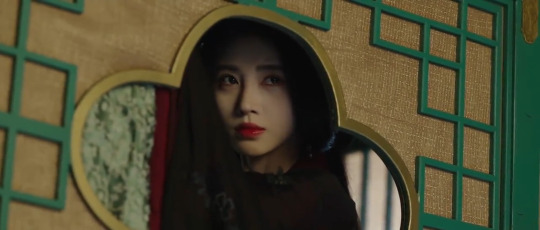
Although I'm not completely convinced about some of the writing choices of In Blossom, I absolutely LOVE the show's production design and cinematography. @mademoiselle-red wrote a great post about how main character Pan Yue fits the gothic romantic lead archetype, and those gothic elements are not only present in the script but also in the show's visual storytelling.
Lighting

A key element of gothic romance is its atmosphere of mystery and suspense.
Something I really like about In Blossom is that despite its dark subject matter, many of its scenes take place during the day. One of the show's main themes is that appearances can be misleading and the cinematography often plays with that notion by linking light to deception and darkness to truth. Note how many of the emotionally honest beats of Yang Caiwei and Pan Yue's relationship happen at night (e.g., their couple escapades at the Li Residence, Ghost Market, and Life and Death gambling house) while fakery, corruption, and evildoing happen in the day. It's with this subversion of our expectations for light that the show creates an unsettling atmosphere.
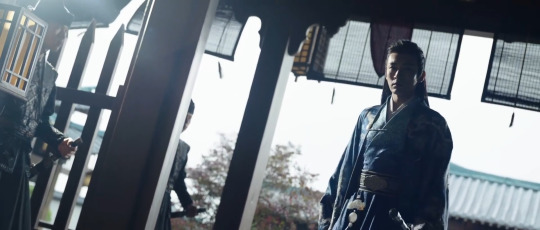
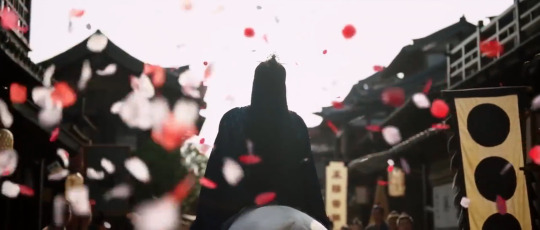
And these lighting choices also help set up Pan Yue as a classic gothic romance anti-hero, someone the female lead, Yang Caiwei, fears but still finds herself drawn to.
Look at how Pan Yue is lit when shot through Yang Caiwei's subjective point of view. The strong use of light creates a lot of contrast--through her eyes, he is a mixture of light and dark, his morality as inscrutable as his shadowy figure.
Camera Angles and Shot Sizes

The show's use of low angles and close-ups further reinforces the idea that Pan Yue is unpredictable and even dangerous.
In cinematography, low-angle shots tend to make the subject look more powerful and menacing, and the show uses this technique to great effect.
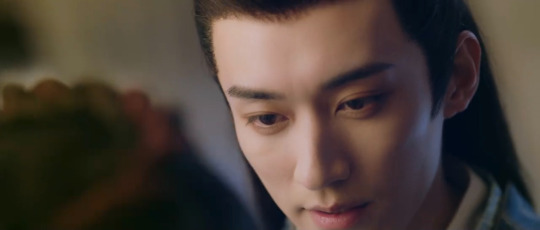
Even in the intimacy of close-up shots, we can sense the threat emanating from Pan Yue. He’s always shot just a smidgeon too close for comfort.
For example, look at how much Liu Xueyi's face fills the frame in an early "romantic" scene. The shot feels almost claustrophobic as if he's so single-minded about his goals that he has no choice but to dominate the frame (and Yang Caiwei). It's an unnerving moment despite the soft words coming out of his mouth.
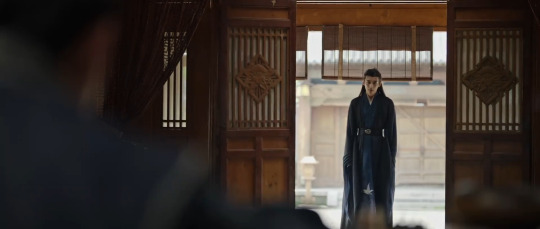
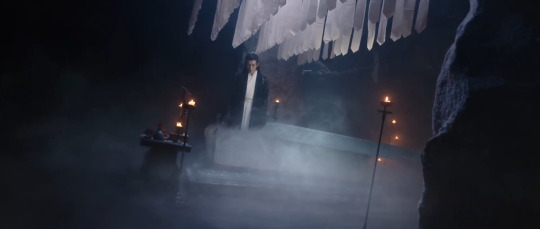
Side Note: I live for Pan Yue's (vampiric) long shots. The production design team was smart for dressing the character in dark clothes with such a sleek cut and drape--he looks like a sexy bat.
The Nosferatu references in Yang Caiwei's tomb are also perfect.
Composition and Framing
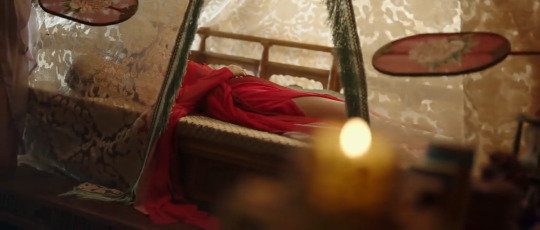

And finally, like any good gothic romance, In Blossom illustrates how love can drive one to despair and even madness.
Because of this, my FAVORITE scene of the show has to be the introduction of Shangguan Zhi. Her obsessive pursuit of beauty in hopes of seducing Pan Yue has left her a shell of a human being, and the scene's composition perfectly encapsulates this with how it focuses on the elegant lines of her body--not her face or personhood.

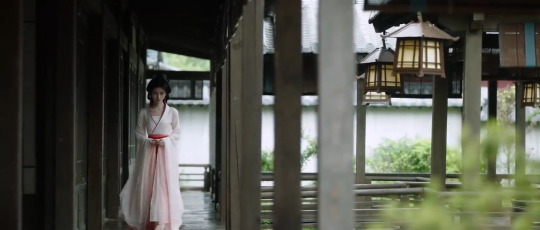
Shangguan Zhi is trapped by her delusional fantasy of a life with Pan Yue--see how she's boxed in by the vertical lines of the screen panel she admires--and the show regularly uses architectural lines to show how her desperation has trapped Yang Caiwei as well.
169 notes
·
View notes
Note
Is it bad that I can't think of descriptive words and phrases at the top of my head when I'm writing? I've always heard that the first draft isn't necessarily the best and you can go back later to fix it but I always feel bad when I can't think of better adjectives/adverbs/etc to use right away.
As creative writers, we are all enticed by the allure of rich vocabulary and fancy language. The prospect of constructing a sentence that shimmers with complex and sophisticated words is nothing short of enchanting. However, when it comes to effective communication, clarity is more important than the vocabulary you use, especially for your first draft.
Why vocabulary is important (and when it isn’t)
From an early age we’re told to improve our vocabularies to make our writing more interesting. And advice like “show, don’t tell” feeds into this. While descriptive writing is great, and I do recommend improving your vocabulary in ways that serve your craft, many writers make the mistake of using unnecessary adjectives because they think it will make their writing better. This simply isn’t the case. It can lead you to use words that aren’t well-known or too complex for the average reader. There exists a pressure to impress with language, but writers must beware of sacrificing understanding for the illusion sophistication. It’s always better to be clear than fancy.
The pitfalls of overcomplicated language
The risk of alienating readers is real. Many might not comprehend convoluted sentences, causing them to lose interest. If you can’t immediately think of an alternative adjective or description, then it likely wouldn’t have come to your readers either. Overcomplicated language can also lead to miscommunication and misunderstanding, which defeats the purpose of storytelling. The distraction of convoluted prose can lead readers away from the plot and the message that you are trying to convey. It’s how you end up with messy descriptions like “sapphire orbs” instead of just saying “blue eyes” which is both clearer and better to read.
Clarity is the essence of creative writing
The primary goal of creative writing is storytelling and connection. It aims to elicit emotions and transport readers to another world. Balancing language and storytelling is crucial in order to achieve this. While rich language can enhance the story, it should not become the story itself. Simplicity in language is often better at conveying complex ideas, ensuring that the message gets across most effectively. If your story is good, it will stand on its own, regardless of how extensive your vocabulary is.
The power of clarity
Clarity in creative writing means expressing ideas in a simple, concise, and coherent manner. It enhances reader engagement, as readers can focus on the plot and characters rather than struggling to understand the language. Vivid and concise descriptions contribute to clear writing, as they bring the story to life without any unnecessary complexity. A description can still be vivid without being complex. All you really want your language to do is effectively portray context.
Balancing vocabulary and clarity
There’s certainly a place for a rich vocabulary in creative writing, to paint vivid pictures and evoke strong emotions. The key is to use the right word at the right time, and not to shoehorn in complex words for the sake of it. For your first draft, you should always focus on telling a good story, and not worry too much about the details of vocabulary. And while you do that, use techniques to expand your vocabulary like those outlined in this post, to help improve your language skills and achieve the right balance between clarity and complexity!
#writeblr#vocabulary#writers#creative writing#writing#writing community#writers of tumblr#creative writers#writing inspiration#writerblr#writing tips#writblr#writers corner#writing advice#writing resources#writers on tumblr#writers and poets#writer#helping writers#writing help#help for writers#advice for authors#improve your vocabulary#resources for writers#let's write#writers block#beat writers block#writer things#tips for writers#writing tips and tricks
321 notes
·
View notes
Text
Tips for creative writers who want to write about fantasy:
1. Build a rich and immersive world: Create a detailed and imaginative fantasy world with its own history, geography, cultures, and magical systems. Consider the rules and limitations of your world's magic to ensure consistency.
2. Develop unique and compelling characters: Craft memorable characters with distinct personalities, strengths, flaws, and goals. Explore how their backgrounds and abilities shape their experiences and interactions within the fantasy realm.
3. Weave in elements of magic and mythology: Introduce mythical creatures, mystical artifacts, and ancient legends into your storytelling. Use them to add depth, mystery, and wonder to your fantasy world.
4. Embrace world-building details: Pay attention to small but significant details in your world-building, such as food, clothing, customs, and languages. These details will enhance the believability and richness of your fantasy setting.
5. Create a compelling conflict: Develop an engaging conflict or quest that drives your story forward. This conflict could involve a battle between good and evil, a personal journey of self-discovery, or a struggle for power and redemption.
6. Blend familiar and unique elements: Combine familiar fantasy tropes with fresh and inventive ideas to create a unique reading experience. Balance the comfort of the familiar with the excitement of the unknown.
7. Use vivid and descriptive language: Paint a vivid picture with your words, using descriptive language to transport readers into your fantastical world. Engage all the senses to bring your settings, creatures, and magic to life.
8. Establish consistent rules and logic: While fantasy allows for imagination and magic, it's important to establish rules and logic within your world. This will ensure that readers can follow and invest in the story without feeling confused or disconnected.
9. Include themes and depth: Explore deeper themes and messages within your fantasy story. Address topics such as power, identity, morality, and the human condition to add layers of depth and resonance to your narrative.
10. Read widely in the fantasy genre: Immerse yourself in a variety of fantasy novels to familiarize yourself with different styles, world-building techniques, and storytelling approaches. Analyze what works and doesn't work for you as a reader and apply those insights to your own writing.
Remember, fantasy writing is an opportunity to unleash your imagination and transport readers to extraordinary realms. Have fun, be creative, and let your passion for the genre shine through in your storytelling.
Happy writing and happy adventures in the realm of fantasy!
#creative writing#creative writers#fantasy writing#fanfic#writing#writing tips#character development#writer on tumblr#writerscommunity#writer tumblr#writblr#writing advice#oc character#fantasy writer#novel writing
427 notes
·
View notes
Text
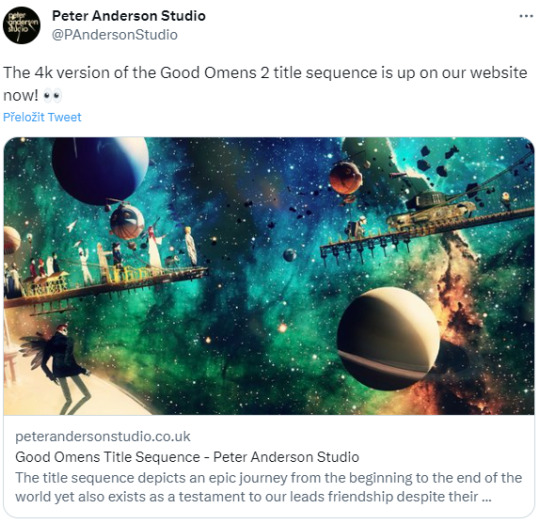
Ooh! 4k version of the S2 Good Omens Opening Title! :)❤
We begin by rejoining the Good Omens universe where we left in series 1, with Crowley rising from the depths of Hell, while Aziraphale gracefully descends from the heavens, both ready to embark on an unprecedented adventure and lead our procession once again. Their odyssey, both grandiose and symbolic, whisks us through a kaleidoscope of surreal and emblematic landscapes.
We continue our procession through a series of intricate scenes, transitioning from biblical to urban to magical realms and progresses into the earth’s interior, and into a cavern of hell. We see urban wasteland resembling an M25 scene, a forest of concrete lift shafts, a familiar Soho scene (this time raining hearts), and a cinema that changes its signage and posters episodically. The urban dereliction then morphs into a landscape filled with props and destruction, leading to an urban precipice where a blinding light engulfs everything.
The artful succession of scenes unveils layers of storytelling, each landscape serving as a narrative catalyst, revealing subtle hints and foreshadowing pivotal developments. Our sequence is a cinematic symphony, harmoniously combining a myriad of techniques from green screen footage and stop motion to 3D and 2D character rigging.
422 notes
·
View notes
Text
Look, it's probably still not time to go really deep into it, but I did mention there are ways this ending where Tomura dies could work for me. Honestly I didn't have much of an issue with chapter 423 itself before the internet's emotional onslaught over it, but now that I'm hearing rumors the chapter was received well in Japan and a number of western fans have decided to couch all their disappointment in racism and rage at the target readership, maybe I should give some cursory thoughts just to counteract the stupid.
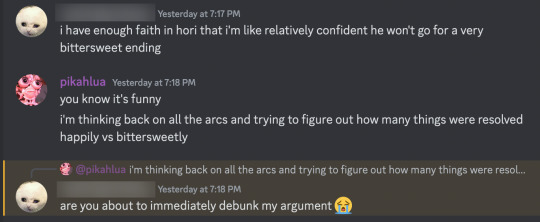
The Bittersweet Ending
Here's the thing. For all the game the bird app likes to talk about how MHA is happy and kid-friendly and not dark and that's bad somehow, it's kind of funny to me how little MHA actually meets expectations in that regard. If I were to divide MHA arcs into categories based on their endings, I would probably have to put the majority of them into the "makes me cry" category. Even arcs where the hero wins with ostensibly happy endings often have absolutely gut-wrenching moments, like All Might's retirement in the Kamino arc, Tsuyu's apology in the UA Dorm Contest arc, and Nighteye's death in the Overhaul arc. I don't think it's possible for me to watch the Sports Festival arc and come out of it with anything but mixed feelings of hope and haunting. Stain may have lost his battle, but his effect on society sure seems to give him the win when it comes to the war. The Paranormal Liberation War arc has a pretty rough ending where there may still be a sliver of hope, but goodness is it a small one.
Sure, some of the teariest moments are a result of happy scenes like Eri smiling for the first time at the cultural festival, but what I'm getting at is that MHA tends to go for more hopeful endings rather than happy ones. And those hopeful endings are often stained by some other tragedy, a price to pay for the hope. Just because MHA isn't full of random death doesn't mean it doesn't contain poignant loss. This was one of its early selling points in fact. MHA's most hopeful moments have always felt so real because the story acknowledges that these things should often play out messily. We've seen the mess, and now chapter 424 has given us a glimmer of hope. The question is now where the story will take us from here.
The Anticlimax
This post has come back for me in the most unexpected way, not gonna lie.
I often hear “anticlimax/anticlimactic” used as a negative criticism, especially colloquially. This criticism assumes an anticlimax is always written unintentionally. But that’s often not the case; anticlimax is actually fucking fantastic when placed in the right hands.
And Kohei Horikoshi is a goddamn anticlimax connoisseur.
I say he’s a connoisseur because Horikoshi has the gall, nay, the gumption–dare I say the balls to showcase the versatility of anticlimax as a storytelling technique for more than just comedy (although he does also use it for comedy a lot). He dares to use it in action scenes, horror/thriller scenes, and even fuzzy heartfelt scenes, all to the great effect of toying with our emotions. And he successfully has us feel exactly what he wants us to every time–because that’s the point. These aren’t cheap jokes; they serve a purpose!
They illustrate an actual, meaningful point about whatever scenario they are used in to make the story more realistic, to combat the fridge logic “well actually” complaints endemic to fandom. Because Horikoshi is a fan himself.
When I write "realistic," I don't mean to apply this quote here to indicate that death (especially for edgy aesthetics) is realistic. I mean to indicate that imperfection is realistic. Izuku isn't a perfect hero. Tomura isn't a perfect victim, and by victim I mean "character for the hero to save." Izuku says it himself:

A perfect victim for the hero to save would yield to the hero's attempts to turn and save them. They would see the wisdom in the hero's position and 100% change sides to agree with them. Trite.
Doing this runs the risk of erasing the victim's identity that comes before. Izuku never has a perfect answer to all of Tomura's problems with the world.
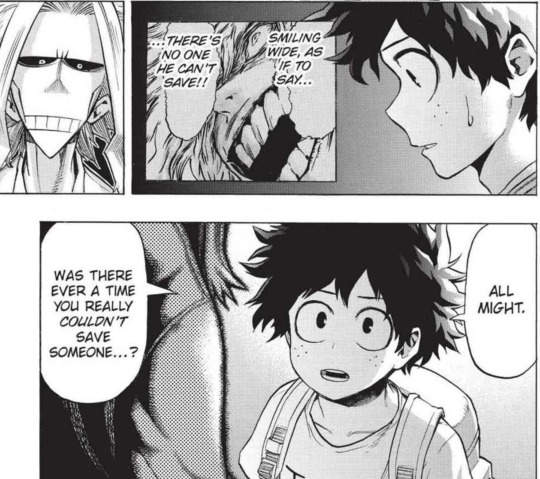
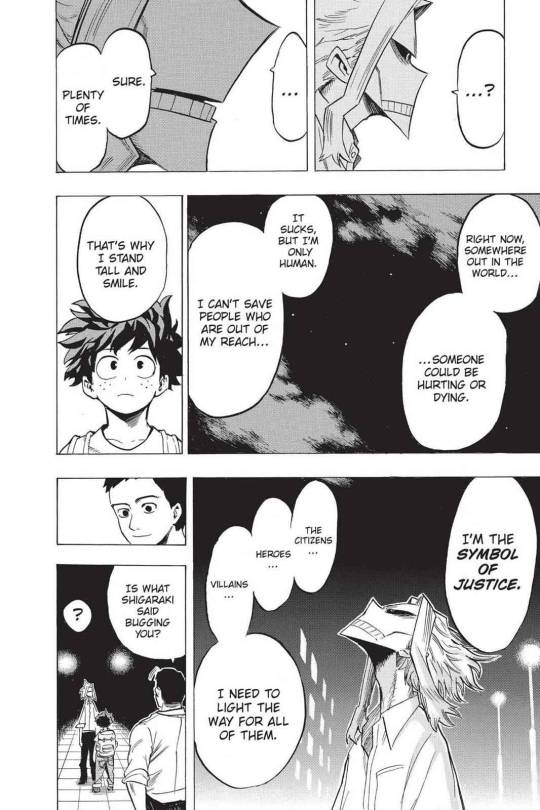
Izuku is the same as All Might. He's only human.
[...]Horikoshi has no compunctions using anticlimax in big, important, non-humorous scenes (even if the anticlimax ultimately adds humor to the scene that was otherwise unexpected). This man has no fear. He ends his famously popular take on the tried and true trope of tournament arcs with one big let-down that affects not just the audience but the in-universe characters.
[...]
You wanna tell me Horikoshi didn’t know exactly what he was doing here? You wanna tell me Horikoshi didn’t know about the fandom war over Katsuki’s hero name? That he didn’t purposefully fucking troll the fandom with this? That this isn’t the single greatest brick joke in the history of published media for its effect both in the canon and in the meta? Fuck you, we’re building up the tension around the most wildly popular character’s hero name reveal for 248 goddamn chapters (that’s five-and-a-half years) just to make it the cringiest fucking thing you’ve ever heard in your goddamn life. His hero name must be the closest audio rendition anyone can imagine shaped like a middle finger and fucking nothing less will suffice. Congratulations, fandom: you played yourselves! You made a war no one could win! Horikoshi could have chosen Ground Zero or Kacchan as Katsuki’s hero name and risked alienating half his fandom either way, but you didn’t realize there was a third option, which of course he took: to risk alienating the entire fucking fandom.
I'm just saying, an ending like this isn't out of character for Horikoshi. In light of this trip down memory lane and Izuku's parallel with All Might in that they acknowledge they cannot save everyone, I'm interested to see what Horikoshi does with this ending whether or not Tomura survives. What sort of hope will he offer?
The extended ending arc
The only real extended ending arc we've had in MHA that might give us a glimpse at the inner workings of Horikoshi's mind is the School Cultural Festival arc. Because of that (and the many other things I've mentioned before this post), I will say there is cause to believe we will have a hopeful ending. Again, I don't know what that looks like. A lot of people seem to have a specific thing they need to have happen to save the story for them, and I cannot speak to those.
Except for Deku vs Kacchan 3, which is what I need to have happen lol. And god does it seem really fucking possible now.
109 notes
·
View notes
Note
Do you have any tips for ADHD writers, especially for motivation and getting WIPs done?
Outlines don't work for me like 99% of the time, so outside of some worldbuilding/character notes and such, I just pants my way through my stories for the most part.
Tips for Writers with ADHD: How to Stay Motivated and Outline Stories
I actually am a writer with ADHD myself, so I completely understand. I tried my best to give you good insight on how you can write a story with ADHD (also tried to make it sound as professional as possible.)
Writing can be a challenging task for anyone, but for those of us with ADHD, it can feel like an insurmountable mountain to climb. Staying focused, motivated, and organized can be a constant struggle. However, being a writer with ADHD also comes with its own unique set of strengths. In this blog post, I'll help you explore some practical tips and strategies to help ADHD writers stay motivated, outline their stories, and unleash their creative potential.
Living with ADHD means that our minds are constantly buzzing with ideas, making it challenging to stay on track and follow through on our writing goals. However, with the right tools and mindset, we can harness our creative energy and turn it into a powerful force for storytelling. So, let's dive in and discover how we can thrive as ADHD writers.
Disclaimer: Remember that everyone's experience with ADHD is unique, and not all strategies may work for everyone. It's essential to find what works best for you and adapt these tips to fit your individual needs.
Embracing Your ADHD Superpowers
Living with ADHD is often seen as a disadvantage, but it's crucial to reframe our perspective and recognize the unique strengths that come with it. As ADHD writers, we possess a natural ability to think outside the box, make connections others might miss, and generate innovative ideas. Embracing these superpowers can fuel our creativity and make our writing stand out.
One of the most significant strengths of ADHD writers is our hyperfocus. While it may be challenging to concentrate on mundane tasks, when something truly captivates our interest, we can enter a state of hyperfocus where time seems to vanish. Use this to your advantage by creating a writing environment that sparks your curiosity and allows you to immerse yourself in your story.
Another superpower we possess is our ability to think quickly and make connections. Our minds are constantly jumping from one idea to another, which can be overwhelming at times. However, this unique thought process can be a goldmine for storytelling. Use it to your advantage by allowing your thoughts to flow freely during the outlining process. Don't be afraid to explore different angles and possibilities.
Lastly, ADHD writers often have a heightened sense of empathy and emotional intelligence. We are incredibly perceptive when it comes to understanding complex emotions and human behavior. This can be a powerful tool when crafting realistic and relatable characters. Draw on your own experiences and observations to breathe life into your fictional creations.
Cultivating Motivation and Consistency
ADHD writers often struggle with maintaining motivation and consistency in their writing practice. We may start projects with great enthusiasm, only to lose interest or become overwhelmed as time goes on. However, there are several techniques we can employ to cultivate motivation and stay on track.
Set small, achievable goals to create a sense of accomplishment. Break down your writing tasks into manageable chunks, whether it's writing a certain number of words each day or completing a specific scene. Celebrate each milestone, no matter how small, and use it as fuel to keep going.
Create a structured writing routine to establish a sense of consistency. Our ADHD brains thrive on routine and predictability. Designate a specific time and place for writing, and make it a non-negotiable part of your daily life. Over time, your brain will associate this routine with creativity and focus, making it easier to get into the writing mindset.
Find an accountability partner or join a writing group. Sharing your progress with others can provide an extra layer of motivation and support. Whether it's a writing buddy who checks in with you regularly or a critique group that offers feedback, the sense of community can keep you motivated and inspired.
Outlining Strategies for ADHD Writers
ADHD writers often struggle with organizing their thoughts and creating a coherent structure for their stories. However, outlining can be a powerful tool to bring order to the creative chaos and provide a roadmap for your writing journey.
Start with a brainstorming session. Let your ideas flow freely without judgment. Write down every thought, character, and plot point that comes to mind. Don't worry about organizing them just yet - the goal is to capture the essence of your story.
Once you have a wealth of ideas, it's time to categorize and organize them. Create a visual representation of your story using tools like mind maps or index cards. This allows you to see the connections between different elements and identify any gaps or inconsistencies.
Use a flexible outlining approach that suits your ADHD brain. Traditional linear outlines may not work for everyone. Consider using non-linear methods like the "snowflake method" or the "puzzle piece method." These approaches allow you to work on different sections of your story simultaneously, keeping your mind engaged and preventing boredom.
Conclusion
Being a writer with ADHD certainly presents its challenges, but it also brings a unique set of strengths and talents. By embracing our superpowers, cultivating motivation and consistency, and employing effective outlining strategies, we can overcome the obstacles and unleash our full creative potential. Remember, there is no one-size-fits-all approach, so experiment with different techniques and find what works best for you. With perseverance and a little bit of creativity, you can become a successful writer, ADHD and all.
#creative writing#on writing#writing tips#writers block#how to write#writers and poets#writing#writeblr#thewriteadviceforwriters#adhd#adhd problems#adhd brain#adhd things#adhd writer#write#novel writing#writersociety#writing blog#writers on tumblr#writerslife#writerscommunity#authors on tumblr#aspiring author#writer#fiction#amwriting#author#novelist#self publishing
376 notes
·
View notes
Text
How Finding the Right Writing Community Can Support You as a Writer

Every year, we’re lucky to have great sponsors for our nonprofit events. Novlr, a 2023 NaNoWriMo sponsor, is the world’s first writer-owned creative writing platform, built by writers, for writers. Today, professional writer and Novlr Community Lead Pamela Koehne-Drube shares some of the benefits a writing community can provide:
I’ve been a storyteller since I first learned to speak and a writer since I first held a pen. The writing journey is an emotional roller coaster, and no single day is ever the same.
There are moments of delight, like when a scene I’ve struggled with finally comes together, or the satisfaction of building a character who comes to life on the page. There’s the sense of accomplishment when my first draft is finished and I get to read my completed story, and the nerves of putting those same words in front of readers for the very first time.
There are lots of silent rooms, the soft tapping of keys, or the scribble of a pen. Sometimes the isolation gets too much, and that’s when I grapple with writer’s block, wrestle with stubborn plot holes, or have to slog through edits I’m just not in the mood for.
In my years as a working writer, the most important thing I’ve learned is that while only I can do the writing, I don’t have to go on the journey alone. A writing community can make all the difference in keeping me motivated.
What is a writing community?
Writing communities are as diverse as the writers who are part of them. Every writer will have a different need from their community, but what they do share is giving writers the opportunity to interact, share knowledge, and provide mutual support.
Some communities come ready-made. NaNoWriMo is a prime example, where diverse writers all rally together to achieve a common goal and support each other along the way. It has been one of my biggest encouragements over the years. And at Novlr, we’ve built an entire writing workspace around the idea of community, not only offering a virtual space for writers to come together and share their wins, struggles, ideas, and techniques but also giving our writer-owners a real say and influence in how our platform grows and develops.
Why are writing communities important?
Writing communities are a lifeline for many of us, offering a nurturing environment where we can learn, grow, and find kinship. Whether it's seeking feedback, gaining inspiration, or just breaking the isolation often associated with writing, they play an invaluable role in any writer's journey.
Encouragement
Sometimes, as a writer, all you need is someone telling you you’re doing a good job. Positive affirmations and encouragement can make all the difference, not only to your confidence but also to motivate you to stick with it. Being able to share ideas, troubleshoot plot holes, and celebrate even the small victories with people who get it is the perfect motivation.
Accountability
Being part of a writing community that openly shares its goals and commitments is a surefire way to motivate you to follow through. Again, NaNoWriMo is a perfect example of this; announcing your intention to the world and to the wider NaNo community makes your 50,000-word draft more than just an idea you have. It makes it real.
This accountability works for smaller goals too. Just sharing them with people makes them a tangible thing to work toward, keeping you accountable and on track to achieve your writing goals.
Become a better writer
Writing groups offer the perfect opportunity to get real-time feedback on your work and expose yourself to diverse and unique perspectives from fellow writers. Not only can they learn from you and your experiences, but you can learn from theirs by championing supportive and constructive criticism.
Rediscover the joy of writing!
There’s something truly special about the collective joy and camaraderie of sharing your writing journey. Writing groups help foster friendships where you can celebrate your shared successes. The challenges of writing become less daunting and more like puzzles to be solved together, and if you involve group activities, like writing prompts or collaborative projects, the process of writing becomes much more vibrant and enjoyable.
What types of writing communities are there?
Writing events
Writing events foster writing communities where each member shares a single goal or focus. NaNoWriMo is, of course, the biggest and most well-known goal-focused event in the creative writing space. I have lifelong writing pals I’ve met over NaNoWriMo, and we still regularly get together for critiques. Last year, I even did a 24-hour novel challenge where we took the NaNo goal of 50,000 words but tried to fit it into a single 24-hour period. It was one of the toughest writing challenges I’ve ever done, but the community that came from it is amazing.
Similarly, online communities, like our Discord, that host regular writing sprints, often attract goal-focused individuals who enjoy the thrill of time-bound writing challenges.
In-person writing groups
In-person writing groups meet at a dedicated time and place, like a local coffee shop, library, or someone's home. I host a writing group at my local pub on one of their quieter afternoons, and there’s a handful of us who get together, exchange ideas, play writing games, provide real-time feedback, and just generally share our work in the spirit of improving our craft.
The value of personal contact can't be underestimated, as it does allow for more nuanced discussions about works in progress and provides a structure that many writers, myself included, find beneficial.
Critique groups
Critique groups, as the name suggests, focus primarily on providing constructive feedback on members' work. These groups are all about sharing drafts and receiving detailed criticism about your writing — anything from accuracy to style and accessibility.
Peer critiques can offer a variety of perspectives on your writing. It’s a great way to find plot holes, character inconsistencies, or stylistic improvements that you might have overlooked early on. Furthermore, by critiquing others' work, you learn to sharpen your own editing skills and gain fresh insights into the writing process.
Writing retreats
Writing retreats are designed to provide writers with a break from their everyday environment and immerse them in a space dedicated to their writing. These retreats can range from weekend getaways to month-long residencies and are often situated in inspiring locations, from country houses to beachfront cabins.
The tranquil and focused atmosphere of a retreat is designed to spark creativity and reduce distractions, allowing writers to concentrate solely on their craft.
Online writing communities
Not everyone lives near other writers or is comfortable seeking out strangers in person. Online writing communities offer a digital space for writers to interact and learn from each other, extending the possibility of collaboration regardless of geographical location.
Platforms like Reddit, Discord, and the NaNoWriMo forums are popular for hosting vibrant writing communities, providing a dynamically interactive space that keeps writers connected, inspired, and motivated in their writing journey, even if they can’t be with other writers in person.
Social media
Social media channels offer various ways for writers to connect, exchange ideas, and foster communities. On Twitter and Tumblr, writers can follow trending hashtags like #writingcommunity, #amwriting, #writeblr, #writingtips, or #NaNoWriMo to engage in conversations, share inspiration, or get advice. TikTok has also recently emerged as another hub for writers, with the #BookTok and #WritingTok trends really taking off.
To sum up
Writing communities come in many forms and serve different purposes, but each offers unique benefits to support and enrich your writing journey. They provide the encouragement, accountability, feedback, and camaraderie needed to navigate the often solitary path of writing. It may be your journey, but you don’t have to take it alone.
As you seek to join or create a writing community, consider what you want from the experience and explore various options that align with your needs, preferences, and schedule. Remember, writing doesn't have to be a lonely endeavour. In the company of fellow writers, the journey becomes a shared experience, making the process less daunting and far more rewarding. Happy writing!
Novlr is free to use. However, for those who need the extra bits, there’s a 40% discount on Novlr Pro for 12 months for NaNoWriMo writers. Simply add the NANO23 coupon code when subscribing at Novlr.org. Offer expires December 31st, 2023.

Pamela Koehne-Drube is all about building creative writing communities where imagination thrives and writers achieve their goals. As a professional ghostwriter and editor, Pamela has first-hand experience in the book trade, from supporting fledgeling writers all the way through to working with the Big Five publishers. She’s an expert on all things writing. In her role as Writer Development & Community Lead at Novlr, you'll find her organising challenges and chatting about writing in Novlr’s Discord and building a repository of amazing writing, editing, publishing, and marketing resources for the Reading Room.
Top photo by Hannah Busing on Unsplash.
#nanowrimo#writing#writing community#community#writing advice#by nano sponsor#novlr#pamela koehne-drube
188 notes
·
View notes
Note
I just wanted to let you know that I just found your tumblr within the past week and you have immediately become my 2nd favorite tumblr, being only behind Blogatog. Love your ttrpg takes.
Anywho, you said to ask about flags, so what is your biggest/are your biggest red flags when it comes to ttrpg design?
thank you! i'm glad you enjoy my silly little posts. anyways i think my biggest red flag is unintentionality--the feeling that the writer of a TTRPG has done something by 'default', the inability to put myself in their shoes and understand (or even better, be told by the text itself) the reason why a particular decision has been made.
one of the biggest places this rears its head is in terms of tone and voice. let me quote jay dragon's really good the storyteller technique:
Another advantage of getting to know the narrator of your RPG is that it helps mitigate unconscious bias in your design. Dungeons & Dragons has a notably anthropological narrative voice, explaining other cultures and creatures like a scientist in the field. The language of D&D mimics the writing style of mid-century scientists traveling to “exotic” locations and cataloging non-Western experiences as part of a documentation of the Other. It’s easy for newer designers to want to “write a game like D&D” without regard for how even the narrative voice of Dungeons & Dragons carries unintended political baggage. Is a bird’s-eye and judgemental perspective really the energy you want to bring to your whimsical fantasy world? Or is there another perspective within your world that can be more useful, and allow you to find new perspectives on the world you’ve created.
narrative tone is a choice--the attempt to use a 'neutral' tone for rules text and description is also a choice, how formal and how informal you get with it is a choice, and when i read a text that seems to have made that choice thoughtlessly it imo bodes very poorly for the rest of the game.
other examples of this kind of unintentionality are games that have a comabt system despite not being about combat in any way--games with equipment rules despite them not setting out to tell the sort of story where which sword or gun a character has matters--games that measure themselves in exact distances without actually using a battlemap--&c.
while most of this unintentionality takes the form of 'falling back onto what DND does' because DND is the market leader and many people's first TTRPG, so imitating it without purpose is something that both cynical market-share chasers & unexperienced designers without a wide range of expereicne can do--it's absolutely not unique to it. one form of unintentionality i see a lot in indie TTRPG circles is creating far more Moves for your PBtA game than necessary--clearly more out of a sense that 'AW/MotW/Masks has a Move for this' than any specific understanding of what that move will do in your game
in game design--as in any art--there is no such thing as a 'neutral' choice or a non-choice. there are only choices, and how much someone's thought about these choices is important!
359 notes
·
View notes
Text
A Step-by-Step Guide to Crafting a Compelling Storyline

I'll warn you, this is a long one. I kind of took 'comprehensive guide' a little too seriously.
You have a fantastic concept burning at the edges of your imagination, a collection of characters whispering their stories to you, and a world just waiting to be explored. But how do you weave all these elements into a story that grips readers and refuses to let go? The answer lies in effective plot planning.
A well-crafted plot isn't just a sequence of events; it's a carefully orchestrated symphony that takes readers on an unforgettable ride. Whether you're an experienced writer or someone trying to start their first book, here are my personal steps to crafting a compelling storyline with good plot planning.
Step 1: Idea Generation and Conceptualization
Every great story begins with a spark of inspiration. It's that moment when an idea ignites in your mind and beckons you to explore its potential. The journey from a fleeting thought to a fully-fledged concept is an exhilarating one, and it all starts with idea generation and conceptualization.
Techniques for Idea Generation
Mind Mapping
Grab a piece of paper or use a digital tool to create a mind map. Write your central idea in the middle and branch out with related concepts, characters, themes, and settings. Mind mapping can help you visualize the connections and possibilities within your idea.
Bullet journalling
Bullet journalling is my personal favourite way to generate ideas for your WIP. Get a piece of paper or open a Word/Docs document and create three different sections: world, characters, and plot. Now add facts to each of those sections that you've come up with so far.
You can even go a step ahead and create more detailed sections, for example, you could do this for your different characters or different places in your world. Usually, one bullet point leads to the next and once you have an idea of everything you've already established you'll naturally start adding more to it.
Blurting
Talk to someone about your WIP, or pretend that you're talking to someone and write down everything that comes to mind. You can even use AI tools like ChatGPT and ask it to hold a conversation with you about your WIP. Tell it to ask you questions along the way, this will get the wheels turning and even help fill plot holes.
Prompts and Challenges
Explore writing prompts or challenges to spark your creativity. Websites, books, or even random word generators can provide the nudge you need to generate fresh ideas.
Refining Your Concept
Once you have a collection of ideas, it's time to refine and shape them into a cohesive concept.
Identify Themes
What themes or messages do you want to convey through your story? Is it a tale of redemption, the power of friendship, or the consequences of ambition? Pinpointing your core themes will guide your storytelling and also give you a clear image of the end goal.
Find Your Angle
Consider what makes your idea unique. How can you approach a familiar concept from a fresh perspective? For example, if you're doing a classic murder mystery, what makes your book different from others? Take some time to look up titles similar to your WIP and find any repetitive themes/patterns.
Maybe most murder mysteries end with the partner being the killer, or maybe the fantasy books written in the same mythology as your WIP's all involve a war. Knowing what is currently a popular trend in the market can give you a clear idea of where you can be different from comparable titles. This is especially important for genres like horror and romance.
Develop a Premise
Your premise is the foundation of your story. It's the "what if?" question that drives your narrative. For instance, "What if an ordinary high school student discovers they have the ability to control time?" You need to have a solid premise before you even think about writing your story.
Step 2: Character Development and Motivation
Characters are the beating heart of your story, and crafting them with depth and authenticity is key to creating a narrative that truly captivates. Your characters often leave more of a lasting impact on your readers than the plot itself.
Think of it this way: a good plot will get you readers, but memorable characters will get you fans. Some of the largest communities in the book space all run on the readers' fondness for certain characters rather than the story itself. Yes, your story and the way you tell it is very important, but nobody wants to listen to the story of a boring person.
Bringing Characters to Life
Personal Histories
Delve into your characters' pasts. What experiences shaped them into who they are today? A traumatic childhood or a life-changing event can influence their motivations and behaviours. Maybe your antagonist has a soft spot for single parents because their mother was the only person who cared for them. Maybe the love interest seems like a sunshine character because they feel the need to always seem put-together and perfect.
Physical Traits
This might sound obvious enough, after all a character's appearance is the first thing people think of when visualising, however, many authors fail to have a clear image of their character's physical traits which can lead to inconsistent or boring descriptions. Sure, your protagonist can have bushy hair and brown eyes, but what else?
Think about their body type, height, fashion sense, the way they carry themselves, walk, and sound. Do they have a random mole at the back of their neck? Do they always smell like a certain perfume because their dead father gifted it to them? It's important for you to have a clear image of who you're writing.
Strengths and Flaws
Just like real people, characters have strengths and weaknesses. These traits affect their decisions and interactions. A courageous hero might also struggle with recklessness, adding complexity to their personality. It's easy to create 2D characters by using tropes or shallow descriptions 'an all-powerful villain' 'the chosen one who trained their whole life and is perfect', but 3D characters are what will actually catch your readers' attention.
There's a reason why people often love the grey characters, the anti-heroes or anti-villains. Those who have complex personalities that make them seem human. This makes us empathise with the characters, and as a writer, it also helps you think of your characters as real people with flaws and problems.
Motivations: The Why Behind the What
Goals and Desires
What do your characters want? Their goals drive the plot forward. A detective's desire to solve a mystery or a scientist's quest for a groundbreaking discovery sets the narrative in motion. Why is your protagonist doing what they are doing?
You could simply give yourself a generic answer like 'they want to save the people' or 'they're a good person' but this can lead to confusion in the long run. If as the writer you yourself can't understand your character's goals it will get very hard to showcase them to your readers. Try to pick apart each character and genuinely consider why they are the way they are.
Inner Conflicts
Characters often grapple with inner turmoil – the clash between their desires, values, and fears. This inner conflict adds layers of intrigue and reliability. Maybe your protagonist realises the antagonist's qualms with the government are actually valid and suffers from moral conflicts as they contemplate whether or not they are the 'good guy'. Inner conflict adds dimension to your characters which in turn makes it easier for your readers to empathise with them.
Step 3: Outlining the Key Plot Points
Now that you have a clear idea of what you want to write and who you want to write it with, it's time to consider the how. You have a story, but how do you want to tell it? Break down the key plot points that shape your narrative, creating a roadmap that guides your characters through their trials and triumphs.
The Building Blocks of Plot
The Inciting Incident
The spark that ignites your story. It's the moment when your protagonist's world is disrupted, setting them on a path of change. For example, in "The Hunger Games," Katniss Everdeen's sister being chosen for the Games is the inciting incident that propels her into the arena.
This can be a little harder to recognise in genres outside of SFF and horror. For a thriller novel, this moment could be the moment your protagonist uncovers a sketchy detail in their relative's death. In romance, it could be the moment your protagonist is introduced to the love interest.
Turning Points
These are pivotal moments that shift the course of your narrative. They introduce new challenges, reveal secrets, or force characters to make crucial decisions. Think of them as the gears that keep your story machine turning. It's important to have some sort of turning point in your story to keep things interesting.
Maybe the character your protagonist was suspecting throughout the first half of the book ends up having a solid alibi, or a seemingly innocent character suddenly seems sketchy.
The Climax
The peak of tension and conflict. It's the moment your characters face their biggest challenge and must make their ultimate choice. In "The Lord of the Rings," the climactic battle at Mount Doom decides the fate of Middle-earth. In a murder mystery, this can be the moment the real killer is unveiled, or in a rom-com, it could be when the love interest moves to a new city to follow the protagonist.
Falling Action and Resolution
As your story winds down, the falling action ties up loose ends and provides closure. Readers witness the aftermath of the climax, and the characters' arcs find resolution. This is the bit where you make sure you aren't leaving any plot holes behind. Remember that random character your protagonist suspected at the start of the book? What's their alibi, why did they suddenly get out of the picture?
Structuring Plot Points
Introduction of Stakes
Introduce what your characters stand to gain or lose early on. This creates a sense of urgency that propels them forward. What if your protagonist fails to complete their missions? What if the detective never unveils the killer's identity? What if your protagonist doesn't win over the love interest? Show your readers the worst possible outcome early on so they know why they should be rooting for your protagonist.
This doesn't necessarily have to be something big or scary. In Harry Potter, many of us wanted Harry to stay at Hogwarts because his life with the Dursleys was cruel and he deserved happiness. That was a small yet significant stake that made the readers empathetic and silently root for Harry.
Foreshadowing and Setup
Plant seeds of future events throughout your story. Foreshadowing builds anticipation and adds depth, making later plot developments more satisfying. I have written a lot of blogs that either cover or briefly mention foreshadowing so I'm going to keep this point a little short.
Foreshadowing helps your readers slowly piece everything together and have that 'I knew it!' or 'how did I not see this coming?' moment. It might also encourage them to turn back and reread your work to focus on the little hints you left throughout the book. Foreshadowing is especially important in murder mysteries.
Step 4: Subplots and Secondary Storylines
Subplots and secondary storylines are the secret ingredients that transform a good story into an unforgettable masterpiece. They add layers of intrigue, provide character development opportunities, and keep readers eagerly turning pages. If you're confused about what is a subplot and how to create one you can visit my previous blog that focuses on this topic.
The Role of Subplots
Enriching Character Arcs
Subplots allow secondary characters to shine. They can showcase different facets of your characters' personalities, revealing their strengths, weaknesses, growth, and relationships.
Theme Reinforcement
Subplots can explore and reinforce your story's themes from various angles. For instance, a romantic subplot can underscore the theme of love and sacrifice, in turn making your protagonist’s heroic death at the end of the novel seem more impactful. We all know Pepper’s reaction to Tony’s death in End Game made the moment more emotional.
While creating subplots and considering which one might be relevant to your book you should think of how this subplot would impact your end goal and whether it would help emotionally connect with your readers.
Parallel Journeys
Subplots can create parallel journeys that mirror or contrast with the main plot. This dynamic adds depth and resonance to your storytelling. Maybe the antagonist’s assistant has a similar backstory to your protagonist but while the protagonist was rescued by the government they were taken in by the antagonist. As the two geniuses face each other your protagonist can’t help but consider whether they would still be fighting for the ‘good’ side had their roles been switched.
Balancing The Main Plot and Subplots
Interconnectedness
Subplots shouldn't feel disconnected from the main plot. Instead, they should interact and influence each other, creating a harmonious narrative flow. Your subplot could help bring a satisfactory end to a certain arc of your story, or it could sow the roots for the important climactic moment of your book.
Pacing and Tension
Strategically introduce subplots to maintain pacing and tension. They can provide moments of relief or heightened drama, enhancing the overall reading experience.
Character Integration
Ensure that characters involved in subplots maintain relevance to the main plot. Their actions and decisions should contribute to the overarching story, even as they pursue their own paths. You should also think about whether or not your character is overshadowing the protagonist. In Harry Potter there were several characters such as Ginny, Luna and Neville with subplots and backstories of their own, however, they never overshadowed Harry’s tale.
Step 5: Crafting Scenes and Sequences
Welcome to the realm where the magic truly comes to life – crafting scenes that resonate, captivate, and propel your story forward. Scenes are the building blocks of your narrative, each one a window into your characters' world and emotions. They help infuse your story with tension, emotion, and unforgettable moments.
Again, this is a topic I’ve covered separately in another blog so I won’t go into too much detail here.
Scene Structure and Elements
Objective and Conflict
Every scene should have a purpose – a clear objective that drives the characters. Introduce conflict that challenges their goals and motivations, creating tension that keeps readers engaged.
Emotion and Stakes
Characters' emotions are the heartbeats of scenes. Amplify emotions by highlighting what's at stake for the characters. Whether it's a heated argument or a tender moment, emotions draw readers in.
Sequences: Crafting a Flow
Cause and Effect
Scenes connect through cause and effect. Each scene's outcome sets the stage for the next, creating a seamless flow that propels the narrative. A character's choice in one scene can reverberate and shape subsequent events.
Rising Action
Craft sequences with escalating tension. The stakes should intensify, drawing characters deeper into challenges and dilemmas. This creates a sense of anticipation that keeps readers eagerly turning pages.
Step 6: Mapping the Journey: Creating a Visual Plot Outline
Visualising your plot, characters, and world can be very hard sometimes. Let's be honest, words can only do so much and if you don't have a clear idea of what you want to show your readers you can end up going down a path of 'telling' them everything. This can take away from the point of your story and end up boring your readers. If you find it hard to visualise where you're going with your book, here are some tips that can help.
Visual Tools for Plot Planning
Timelines and Flowcharts
Create a timeline that outlines the sequence of major events, from inciting incidents to resolution. Flowcharts visually depict the interconnectedness of plot points, making it easy to track the evolution of your story. You can also cut out or add bits depending on how far along you are. This will also help you keep track of what scene/development should be introduced when and why.
Index Cards or Post-Its
Write down key scenes, plot developments, and character arcs on individual index cards or sticky notes. Arrange and rearrange them on a board or wall to visualize the narrative's flow. You can also do this if you're confused about the climax of your novel by adding different ideas to the post-its and putting them alongside the rest of the book's plot to see what things would look like from a reader's perspective.
Infusing Creativity
Playlists
Curate a playlist that captures the mood and emotions of your story. Music has the power to transport you to the heart of your narrative, helping you channel the right atmosphere while plotting. You can listen to this playlist every time you sit down to write WIP. With time, this will also help you overcome writer’s block since you can put on this playlist every time you struggle to get into the right writing mindset.
Moodboards/Pinterest Boards
Create a visual feast by collecting images, aesthetics, and visuals that embody your story's essence. Platforms like Pinterest allow you to craft moodboards that serve as visual touchstones. I would recommend creating a separate pinboard for every character so you can get a clear idea of their vibe and appearance. You can even refer to these every time you're writing about or from the perspective of a new character.
Step 7: Flexibility and Adaptability
As you embark on your writing journey, remember that stories have a life of their own. Embracing flexibility and adaptability is your compass through uncharted territories.
Allow characters to surprise you, let plots pivot, and themes emerge. Balancing structure with spontaneity ensures a dynamic narrative that resonates deeply. Listen to your characters, explore ethical complexities, and evolve alongside your story.
By staying open to the unexpected, you infuse your writing with authenticity and richness. Your plot outline is a guide, but your characters and themes have the power to shape the course. Embrace the unpredictable, and watch your story flourish beyond your imagination.
I hope this blog on A Step-by-Step Guide to Crafting a Compelling Storyline will help you in your writing journey. Be sure to comment any tips of your own to help your fellow authors prosper, and follow my blog for new blog updates every Monday and Thursday.
Looking For More Writing Tips And Tricks?
Are you an author looking for writing tips and tricks to better your manuscript? Or do you want to learn about how to get a literary agent, get published and properly market your book? Consider checking out the rest of Haya’s book blog where I post writing and publishing tips for authors every Monday and Thursday! And don’t forget to head over to my TikTok and Instagram profiles @hayatheauthor to learn more about my WIP and writing journey!
#hayatheauthor#haya's book blog#haya blogs#writers on tumblr#writer community#writer tools#writer blog#writer stuff#writer wednesday#writer tips#creative writing#writers of tumblr#writerscommunity#writeblr#writing community#writer spotlight#writer things#writing prompt#writing tools#writing stuff#writing#writing life#writing inspo#writing help#writing advice#writing inspiration#writing ideas#writing things#writing tip
228 notes
·
View notes
Text
Reflections? (Yesterday's Lie)
The term “holding up a mirror” usually applies to confronting someone with their own actions and pointing out their flaws. Stories like to do this through foils that share enough characteristics to annoy each other, or villains and heroes that are either the best or worst version of each other. It’s a really neat piece of storytelling.
Yesterday’s Lie is this idea in its most blatant form. Luz literally looks into a mirror and argues with her reflection. Its straightforward and simple.
Except this is The Owl House, it’s not capable of playing anything straight.
Let me explain.
SPOILERS AHEAD: (The Owl House, Dead Poet Society, Billy Elliot, Gravity Falls)

One of The Owl House’s core thematic is individuality and the joy of complexity. It is a story about taking life as it is and not putting unfair constraints on it.
This is why the show is so tropey and so averse to tropes at the same time. It makes a beeline for the closest stock structure and then thoroughly dissects and subverts it. It’s a satire, a hunter of cliches.
As a way of hammering that home, everything in the series is introduced twice. Whenever any plot beat or location is revealed, you get a first pass and a shallow look at that thing, and you get an obvious trope that this first appearance fits into, then you spend time with the thing, and you start to understand just how much that first impression was deceiving. This happens to everything, even the show itself.
The series opens with the famous “eat this sucka!” line and a fantasy witch story, priming you to expect generic fantasy, but you are then met with The Owl House, which is anything but.

Hey look, a conspicuously hidden character from a family photo. This is foreshadowing for a later episode. But if you think about it, this filmmaking technique is weird, right? Telling you something is important by now showing you it at all. I don't have anywhere I'm going with this, it's just something quirky about cinematography.
This also happens to the characters, and I go into more detail about it in my post about the first episode, so take a look at that if it interests you. But there was one notable exception to the rule. Camila Noceda.

When we first see Camila, she is the distant parent, the stock character in a million coming of age stories. She doesn’t really get her child and is sending them off to a place to make them more “normal”. It's going to be a difficult relationship, and the parent won’t get more depth beyond this.
She fits in with Niel’s parents in Dead Poet Society and Jackie from Billy Elliot. Stern, and antagonistic as a result of the theming. Like I said, the story is about how people can’t be defined, and here is a character who wants to box in the protagonist.
Notably, Dead Poet Society ends with the death of Niel as a direct result of the parental strictness, which isn’t a good sign for how this might turn out.
Then Luz runs away, and we don’t get to see anything beyond the stereotype for a season and a half. We instead get Luz feeling guilty and confronting her fears of betraying her mother through a monster that pretends to be that fear. We still don’t meet Camila.
Until we do, and things are immediately different.

The Camila Noceda from season one was refined and busy. She had a uniform on, and her hair up in a tight bun. It’s a refined image that looks down on you with distain. Now, however, she has let her hair down and wears more casual clothes over that uniform, she’s practical but laid back. She’s had things added to her instead of taken away.
It's also notable that the first thing she does in this episode is help a wounded creature. Camila’s second introduction is one of fundamental kindness.

Meanwhile, Vee is Luz’s reflection, except no she isn’t at all. She is the polar opposite of Luz. She wants mundanity rather than adventure, she wants a new life rather than both lives at once, she actively disguises herself rather than seeking to be understood. Vee is only Luz in appearance. Case and point:

Luz - "Cool, talking rats. Maybe they know something."
Vee - "(Screams and runs away)"
Camila is aware that something is up, but she’s not used to the magical world that we are, so she assumes that Luz has changed, and she is concerned that the summer camp thing has worked too well.
Vee also gets the multiple introductions. A few episodes ago, she was shown as a shadowy figure who had replaced Luz like a changeling and the filmmaking heavily implied a Machiavellian air to the character. The musical sting, the shot composition and build up, this was a villain.
Then we meet her and she’s a wus. She’s cowardly, and meek, and I love her so much. Except once again, not exactly.

But that leads into the plot of this episode, because this isn’t about Luz, it's about the world she left behind. Luz is secondary in this story, filling the role of a mentour until the very end. It’s another mention of how Luz operates as a character, inspiring people as a light for them to follow, (Light, do not faulter) but it's also not the point.
Vee needs to learn to be herself and that she has found people who will love her not just in spite of it, but because of it, and Camila needs… well she needs to show off her compassion, but she also needs to confront the fact that she directly caused this entire adventure.

“You and I are not the same. You had a mom who loved you, a home, a life, you had it good! And you still wanted to run away, I didn't have a choice. My real name is Number Five. I'm a Basilisk, and technically, I shouldn't exist.”
Something that blew my mind more than it probably should have here is that Vee’s name comes from the Roman numeral for five, that being V. This might be obvious or obscure, but it is something my brain fixated on, and y’all must know.
This is worldbuilding for Belos as well, and we’re really dropping the subtlety with this episode. Belos is a man who desires to eradicate an entire people because they are not like him, a man who experiments on people because they have something he doesn’t and it doesn’t occur to him that their lives have value, a man who assigns numbers instead of names to people whom he plans to exterminate.
Compare Belos to Bill Cypher. Bill was otherworldly and eldritch, an unknowable evil. Belos is the type of villain whom real world history has known, and people who are still alive today will recognise.
Belos is his own person, sure, but he’s also fascistic eugenicist who thinks he’s G-d because of something he was born with and decided entitled him to everything. Belos is Evil.

The fact that Belos is experimenting on the Basilisks with the hope of learning to drain magic seems like an throw away detail. It doesn't come up again in this episode, but if you've seen the series in full, you know why this is important.
But he’s also mundane, and pointedly so. The thing that caused Belos to get this bad was such a simple thing, wilful ignorance. I’ll get into it more specifically when I cover Elsewhere and Elsewhen and Hollow Mind, but suffice to say this:
Belos ignored so many obvious things in his life because he didn’t want to contradict a worldview that put him on top, and he kept doing it and kept going and going and going until he doesn’t have to try. People aren’t people to Belos.
Which leads me back to what I was saying about character introductions, funnily enough. This is a story about teaching Luz and the audience to look past tropes and preconceptions to see people as complex. Belos cannot do this, and that is directly what causes his villainy.
Belos ain’t even directly in this episode and he’s got me livid.

Still think Warden Wrath is just a quirky little goober?
Also, the Basilisks were brought back from extinction. Like in Jurassic Park. Belos is playing G-d.
This does kind of reframe Michaela Dietz’s performance as Vee though, doesn’t it. She goes from jumpy to traumatized. She’s a survivor and a child at the same time. Of course she’s like this, who wouldn’t be?
This is a character whose voice acting and line writing come across as dissonantly weighty. Like this character has seen more shit than she should have at her age, because she has.

I seriously cannot praise Michaela Dietz enough here.
Also, the point at Luz is a point well made. Luz ran away without thinking things through and without the consequences occurring to her. She took what she had for granted, and Vee rightfully calls her out for it.

Jacob is Belos wanna be. He’s a conspiracy theorist but in a really interesting way.
He gets introduced twice, but in reverse order. His traps and cameras are shown first, then he is introduced and he’s just a normal guy, then it is revealed who he really is. Like I said, this happens to everyone in the series.
However, there are a few ways you can run a conspiracy theorist in a story. Maybe he’s wrong and the magical world doesn’t exist and he’s just seeing patterns where there are none. But this is The Owl House, that doesn’t apply here.
Alternatively, Jacob could be right about everything and find his way into the Boiling Isles. Needless to say, this doesn’t happen.

This shot bounces between Vee's and Jacob's perspective, but always with the cage in front of them. As if they are both trapped by their own minds.
Instead, Jacob is actually wilfully ignorant. He’s the “we have Belos at home” of this story and is just what Vee needs to confront. He’s got something in his mind that he believes beyond all evidence, and when something is shown that would challenge his worldview, instead of adapting, incorporates it on a surface level without taking the time to understand what it actually is.
Jacob believes in aliens from Mars, and he is so fixated on his discovery that he doesn’t stop to ask if it actually proves him correct. Instead, he assumes mal intent because the creature isn’t like him, and therefore the creature must surrender all privileges. Most notably freedom.
Jacob is small, and petty, and definitely not as megalomaniacal as Belos. But I ask you this, if he got into the Demon Realm, what would he do?

Enter Camila, who is a direct contrast to Jacob specifically. She is shown information that rocks her worldview, and what does she do? She changes her worldview. Mostly.
There is magic. Ok. This is not Luz. Ok. This creature must die. Hold up.
Camila actually keeps most of her ethics identical. She will not witness injustice and she will never be unkind. She’s a vet, she treats everything with compassion no matter what species.

She gets two lines in short succession to really exemplify this.
“Hello, this is all so confusing, but who knew I had such a strong girl living under my roof this whole time”
It’s affirming and reassuring. Compassion first and foremost.
“I’m the good guy here!”
“Yeah. A lot of bad guys say that.”
Essentially, screw your god complex, I will not be told what to think. I have learned, and I reject the wilful ignorance you stand for. It’s also just a killer one liner and it sounds cool.

Even the lighting knows what's up. Camilla is lit from above, like an avenging angel looking down on Jacob's small minded ignorance.
On the other hand, I said “most” in reference to Camila’s changing ethics, and I meant it. Camila starts the story trying to box Luz in, because she thinks it will make her life easier and safer. But she gets shown here that she was wrong in at least half of that. Luz cannot stop being herself, nobody can, so Camila needs to stop expecting people to fit with society’s preconceptions.
Camila gets more background later on in the series, and I will talk about it when I get there, but she learns, and she is willing to change. That’s the important thing.

Speaking of which, I drew comparison to Jackie from Billy Elliot and I know at least one person will get really upset by that. And let's explain why.
Jackie isn't the trope I mentioned either. One main theme of Billy Elliot is the price of freedom, and Jackie spends the first part of the film seeking personal freedom because he thinks that will trickle down to his son. But he doesn't realise that doing that is directly causing his child to be miserable.

I studied this film in high school and I have it drilled into my brain that the sartorial design of this scene reflects Jackie's sacrifice. Usually, he contrasts with his environment. But now, as he breaks down and returns to the mine, he is one with it in colour scheme resigned to be nothing more than a cog in the machine.
So, in the best scene in the movie, Jackie breaks down and sacrifices his own freedom to pay for his son's dream. Its heart wrenching, and its similar to Camila. Both of them start off disapproving and boxing their children in and learn to be better.
These people are similar, that's why the series introduced Camila using the trope, but they both split from it, and they are both their own person. Everyone is an individual.

That final scene is painfully well written. You know exactly why Camila and Luz would say what they say, why they would miscommunicate, and what is holding them back. Who is right here? I would argue both of them.
Camila looks at a place called “the demon realm” and, as a mother, assumes the worst. She wants nothing but the safety of her children, and she hasn’t been shown anything that dissuades that. Instead, you get Luz saying this:
“Staying here was the best decision I ever made.”
Of course Camila would take this the wrong way, of course this would go so badly for Luz. But it also goes badly for Camila, who now has to reconcile the fact that, despite everything else, Luz made the decision to stay in a more dangerous place because it understood her better than her home. That’s a difficult thing to hear for a mother, but it's something to reflect on.

Meanwhile, Luz now has tried her best to be understood by the person she wants to connect with the most, and she has failed due to her own inability to communicate. The series is creating a conflict and creating a duality, Luz must choose at the end whether to stay in the Demon Realm or go to the Human World. Its an impossible decision planted really well, and in my opinion, it will pay off incredibly.

I think there's some symbolism here, but I just can't quite figure it out.
Final Thoughts
I feel the need to remind y’all that this was on Disney, apparently aimed at kids seven years and older. Don’t get me wrong, kids are more intelligent than people give them credit for and can understand complex themes really well, even if they don’t have the skills to articulate that. But there are some things in this episode alone that feel aimed at an older audience.
Maybe that’s why Tumblr likes this series so much. It’s the type of story that appeals to people of any age, but can be understood by someone very young, and can act as role models for kids growing up.
The reason I say this, is that when I looked up the age rating of The Owl House, I did find a review that made me laugh:
One star, 18+
“There’s kissing which is ew”
Next week, I’ll be covering Follies at the Coven Day Parade, which explores the theme of duality, but also gives Kikimora complexity, something I was not prepared for at all. So, stick around if that interests you.
Previous - Next
#rants#literary analysis#literature analysis#what's so special about...?#character analysis#the owl house#toh#toh luz#luz noceda#the owl house luz noceda#the owl house luz#the owl house camila#camila noceda#toh camila#toh vee#vee noceda#meta#meta analysis
41 notes
·
View notes